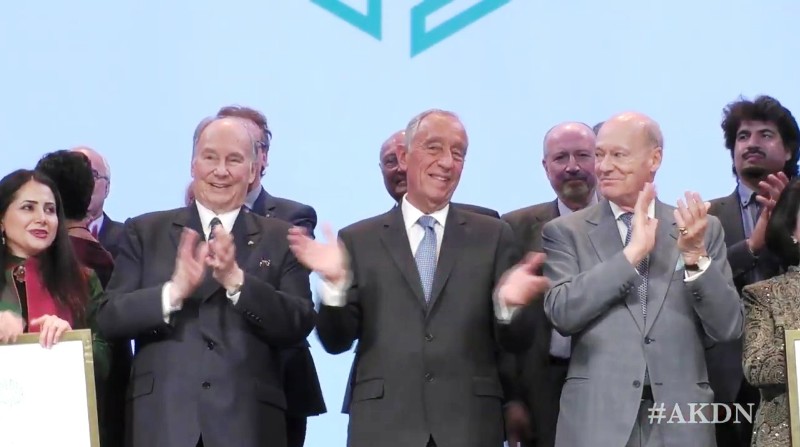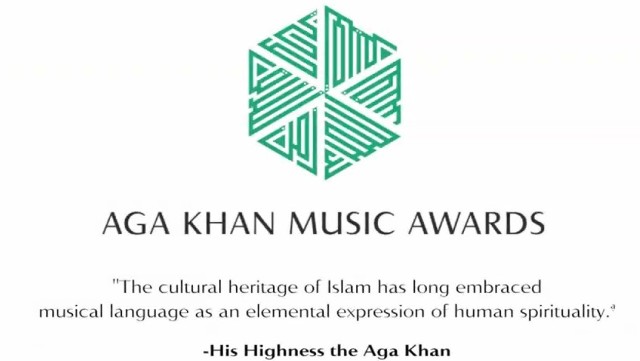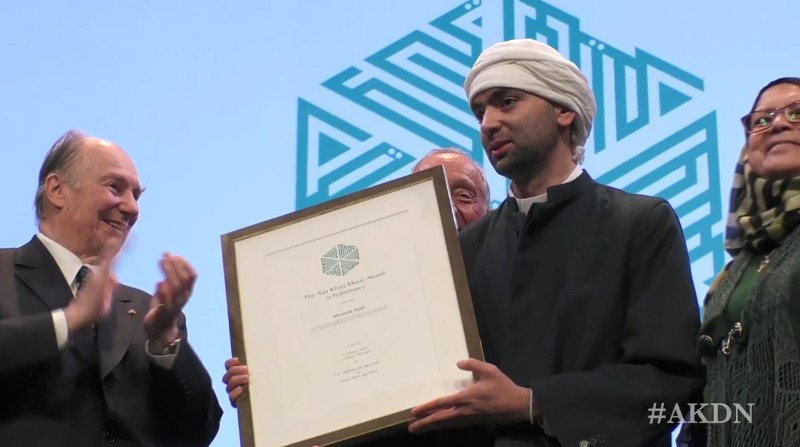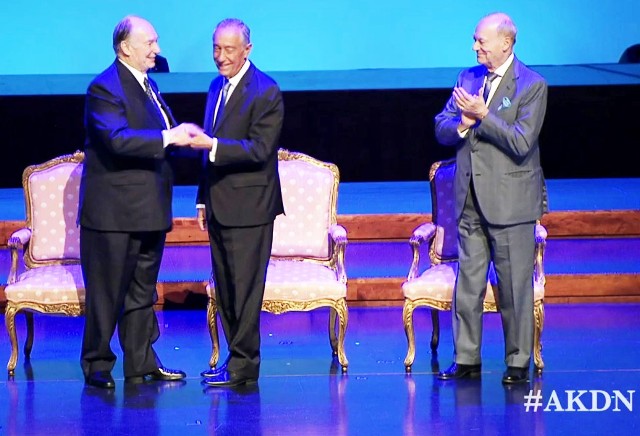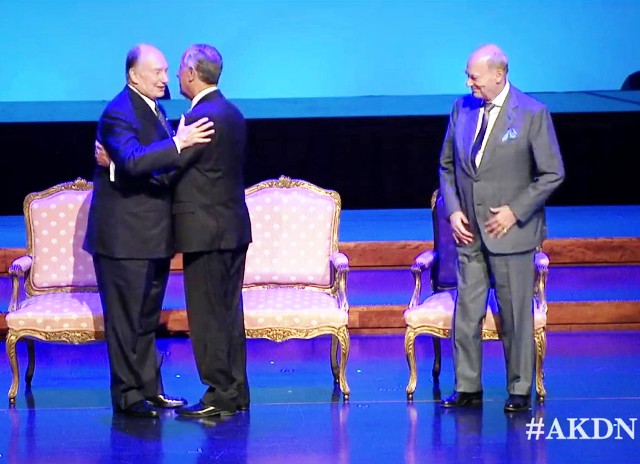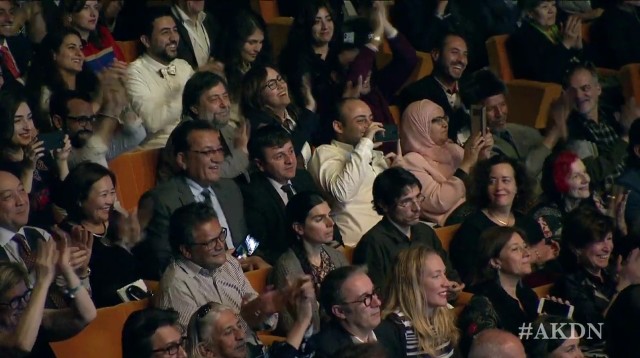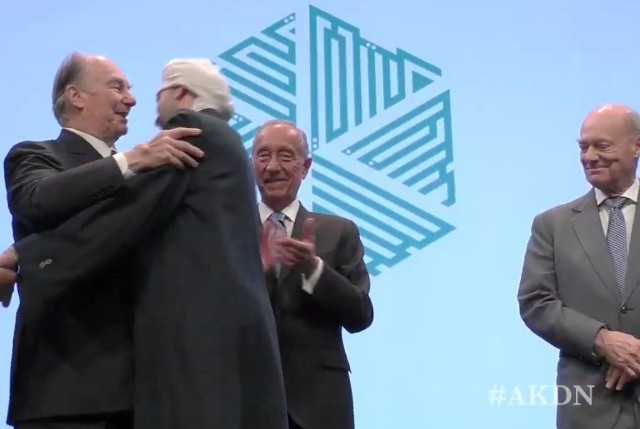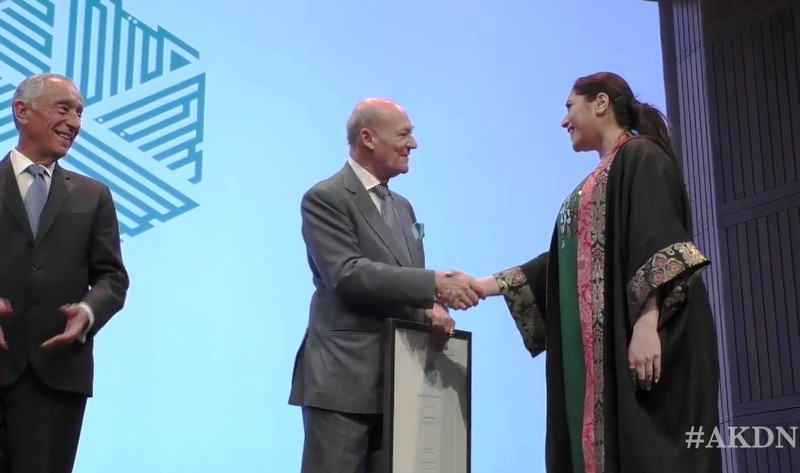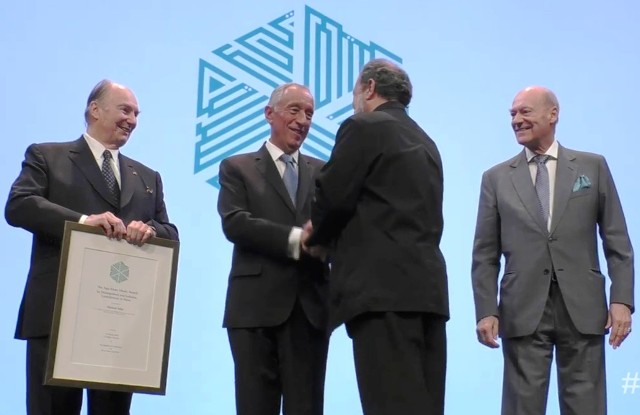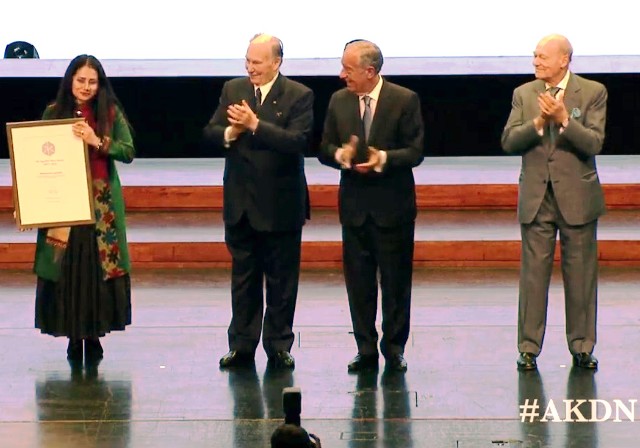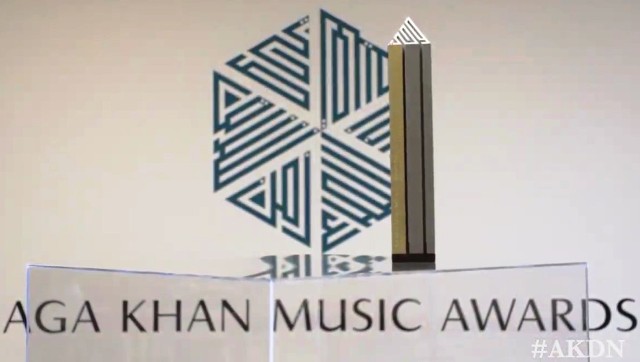AGA KHAN MUSIC AWARDS 2019
AGA KHAN MUSIC AWARDS 2019
Mawlana Hazar Imam announces new global prize for music
Today, Mawlana Hazar Imam announced the establishment of the Aga Khan Music Awards.
The awards, which come with US$ 500,000 in prizes, will recognise exceptional creativity, promise, and enterprise in music performance, creation, education, preservation and revitalisation in societies across the world in which Muslims have a significant presence.
“The Aga Khan Music Awards will aspire to fill a unique cultural role,” Mawlana Hazar Imam said during the announcement.
Unlike many of the world’s music prizes, these new awards will focus on the constellation of devotional music and poetry, of indigenous classical music, traditional folk music, and tradition-inspired contemporary music that has flourished in cultures shaped by Islam.
The first Aga Khan Music Awards ceremony is scheduled to take place in Lisbon, Portugal from 29-31 March 2019 and will be co-hosted by the Calouste Gulbenkian Foundation and the Lisbon Municipality.
To learn more about the awards, visit the AKDN website.
https://the.ismaili/news/mawlana-hazar- ... rize-music
*******
Aga Khan announces new global prize for music
First Award Ceremony to be held in 2019 in Lisbon at Gulbenkian Foundation
Geneva, Switzerland, 21 March 2018 - His Highness the Aga Khan announced the establishment of the Aga Khan Music Awards today.
The Awards, which come with US$ 500,000 in prizes, recognise exceptional creativity, promise, and enterprise in music performance, creation, education, preservation and revitalisation in societies across the world in which Muslims have a significant presence.
The first Music Awards ceremony is scheduled to take place in Lisbon, Portugal from 29-31 March 2019 and will be co-hosted by the Calouste Gulbenkian Foundation and the Lisbon Municipality.
“The Aga Khan Music Awards will aspire to fill a unique cultural role,” said His Highness the Aga Khan. Among the world’s many music awards, none of the current awards or prizes focus on the constellation of devotional music and poetry, of indigenous classical music, traditional folk music, and tradition-inspired contemporary music that has flourished in cultures shaped by Islam.
These musical genres and styles embody music’s traditional role as a source of spiritual enlightenment, of moral inspiration, and of social cohesion. At a time when strengthening tolerance and pluralism seems to have become an acute worldwide priority, music offers an exciting medium for reaching and involving global audiences.
The Music Awards will be governed by a steering committee co-chaired by His Highness the Aga Khan and his brother Prince Amyn Aga Khan, and will be administered by the Aga Khan Music Initiative. Nominations for the Awards will be solicited from a group of some 100 music specialists around the world. The Master Jury that selects winners will be drawn from eminent musicians, festival directors, record producers, and arts education leaders, among others.
Award-winners will pursue professional development opportunities arranged in collaboration with the Music Awards during each triennial awards cycle. These opportunities will include commissions for the creation of new works, contracts for recordings and artist management, support for pilot education initiatives, and technical or curatorial consultancies for music archiving, preservation, and dissemination projects.
More...
http://www.akdn.org/press-release/aga-k ... rize-music
Today, Mawlana Hazar Imam announced the establishment of the Aga Khan Music Awards.
The awards, which come with US$ 500,000 in prizes, will recognise exceptional creativity, promise, and enterprise in music performance, creation, education, preservation and revitalisation in societies across the world in which Muslims have a significant presence.
“The Aga Khan Music Awards will aspire to fill a unique cultural role,” Mawlana Hazar Imam said during the announcement.
Unlike many of the world’s music prizes, these new awards will focus on the constellation of devotional music and poetry, of indigenous classical music, traditional folk music, and tradition-inspired contemporary music that has flourished in cultures shaped by Islam.
The first Aga Khan Music Awards ceremony is scheduled to take place in Lisbon, Portugal from 29-31 March 2019 and will be co-hosted by the Calouste Gulbenkian Foundation and the Lisbon Municipality.
To learn more about the awards, visit the AKDN website.
https://the.ismaili/news/mawlana-hazar- ... rize-music
*******
Aga Khan announces new global prize for music
First Award Ceremony to be held in 2019 in Lisbon at Gulbenkian Foundation
Geneva, Switzerland, 21 March 2018 - His Highness the Aga Khan announced the establishment of the Aga Khan Music Awards today.
The Awards, which come with US$ 500,000 in prizes, recognise exceptional creativity, promise, and enterprise in music performance, creation, education, preservation and revitalisation in societies across the world in which Muslims have a significant presence.
The first Music Awards ceremony is scheduled to take place in Lisbon, Portugal from 29-31 March 2019 and will be co-hosted by the Calouste Gulbenkian Foundation and the Lisbon Municipality.
“The Aga Khan Music Awards will aspire to fill a unique cultural role,” said His Highness the Aga Khan. Among the world’s many music awards, none of the current awards or prizes focus on the constellation of devotional music and poetry, of indigenous classical music, traditional folk music, and tradition-inspired contemporary music that has flourished in cultures shaped by Islam.
These musical genres and styles embody music’s traditional role as a source of spiritual enlightenment, of moral inspiration, and of social cohesion. At a time when strengthening tolerance and pluralism seems to have become an acute worldwide priority, music offers an exciting medium for reaching and involving global audiences.
The Music Awards will be governed by a steering committee co-chaired by His Highness the Aga Khan and his brother Prince Amyn Aga Khan, and will be administered by the Aga Khan Music Initiative. Nominations for the Awards will be solicited from a group of some 100 music specialists around the world. The Master Jury that selects winners will be drawn from eminent musicians, festival directors, record producers, and arts education leaders, among others.
Award-winners will pursue professional development opportunities arranged in collaboration with the Music Awards during each triennial awards cycle. These opportunities will include commissions for the creation of new works, contracts for recordings and artist management, support for pilot education initiatives, and technical or curatorial consultancies for music archiving, preservation, and dissemination projects.
More...
http://www.akdn.org/press-release/aga-k ... rize-music
The first ceremony of the Aga Khan Music Awards is scheduled to take place in Lisbon, Portugal from 29 to 31 March 2019 and will be co-hosted by the FC Gulbenkian and the Lisbon Municipality[/b]
http://indianexpress.com/article/entert ... e-5107882/
The Aga Khan Music Awards are scheduled to take place in Lisbon, Portugal, from March 29 to March 31, 2019.
The Aga Khan announced a global prize for music through the Aga Khan Music Awards scheduled to take place in Lisbon, Portugal, from March 29 to March 31, 2019. The awards will recognise creativity and enterprise in music across the world in which Muslims have a significant presence. Co-hosted by Calouste Gulbenkian Foundation and the Lisbon Municipality, the awards will be in addition to the Aga Khan Award for architecture and Global Pluralism awards instituted by the Aga Khan.
http://indianexpress.com/article/entert ... e-5107882/
The Aga Khan Music Awards are scheduled to take place in Lisbon, Portugal, from March 29 to March 31, 2019.
The Aga Khan announced a global prize for music through the Aga Khan Music Awards scheduled to take place in Lisbon, Portugal, from March 29 to March 31, 2019. The awards will recognise creativity and enterprise in music across the world in which Muslims have a significant presence. Co-hosted by Calouste Gulbenkian Foundation and the Lisbon Municipality, the awards will be in addition to the Aga Khan Award for architecture and Global Pluralism awards instituted by the Aga Khan.
Aga Khan Music Awards
The Aga Khan Music Awards recognise outstanding creativity, promising talent and initiative in the fields of performance, creation, education, preservation and musical revitalisation in societies where Muslims have a significant presence. Awarded by the Aga Khan Music Initiative, prizes will be presented during a three-day free-entry ceremony that includes concerts, competitions and conferences. A highlight will be the participation of the Master Musicians of the Aga Khan Music Initiative, a group of artists who create new music inspired by the cultural legacies of the Middle East, the Mediterranean Basin, Central and South Asia, West Africa and China.
29 March
Opening Ceremony and Opening Concert by the Master Musicians of the Aga Khan Music Initiative and the Gulbenkian Orchestra
30 March
Presentations to the jury by the nominees and contestants in Music Creation and Musical Performance
31 March
Awards, Winners’ Conference and Gala Concert
More...
https://gulbenkian.pt/musica/en/evento/ ... ic-awards/
The Aga Khan Music Awards recognise outstanding creativity, promising talent and initiative in the fields of performance, creation, education, preservation and musical revitalisation in societies where Muslims have a significant presence. Awarded by the Aga Khan Music Initiative, prizes will be presented during a three-day free-entry ceremony that includes concerts, competitions and conferences. A highlight will be the participation of the Master Musicians of the Aga Khan Music Initiative, a group of artists who create new music inspired by the cultural legacies of the Middle East, the Mediterranean Basin, Central and South Asia, West Africa and China.
29 March
Opening Ceremony and Opening Concert by the Master Musicians of the Aga Khan Music Initiative and the Gulbenkian Orchestra
30 March
Presentations to the jury by the nominees and contestants in Music Creation and Musical Performance
31 March
Awards, Winners’ Conference and Gala Concert
More...
https://gulbenkian.pt/musica/en/evento/ ... ic-awards/
The Aga Khan Music Initiative: Preserving, transmitting, and developing cultural heritage
Often referred to as a universal language, music provides a common theme to bring people together. Intended to entertain, educate, and inspire thought; music also has the ability to inform listeners about the diversity of artistic expression, and by extension, the diversity of peoples and cultures.
Through the Aga Khan Trust for Culture, the Aga Khan Music Initiative (AKMI) works to promote the revitalisation of cultural heritage both as a source of livelihood for musicians and as a means to strengthen pluralism in nations where it is challenged by social, political, and economic constraints.
One of the latest AKMI initiatives was the announcement, made earlier this year, of the establishment of the Aga Khan Music Awards. These awards aspire to do for music what the Aga Khan Award for Architecture has done for the field of architecture in the Muslim world over the last 40 years. The first Aga Khan Music Awards ceremony will take place in Lisbon, Portugal in March 2019.
As part of the announcement, it was stated that the awards will recognise “exceptional creativity, promise and enterprise in music performance, creation, education, preservation and revitalisation in societies across the world in which Muslims have a significant presence.”
“Among the world’s many music awards, none focus on the constellation of devotional music and poetry, of indigenous classical music, traditional folk music, and tradition-inspired contemporary music that has flourished in cultures shaped by Islam.”
The Aga Khan Music Awards will also provide recognition, financial support, and further professional development opportunities to award winners, thus providing rare, and much needed economic stimulus for musicians to continue in their chosen profession.
At the White House Conference on Culture and Diplomacy in 2000, Mawlana Hazar Imam alluded to the need to provide financial support to sustain artistic and cultural development. He said, “The reality in the countries of Asia and Africa is that the material resources required to sustain cultural activities are either not available because of higher priorities, or because there are no incentives to support culture… It is my dream that private individuals and organisations will come to the support of culture, as has been the case for centuries in the industrialised world.”
AKMI was launched that same year by Hazar Imam to provide such support to talented musicians and music educators working to preserve, transmit, and further develop their musical heritage in contemporary forms. Now, 18 years later, AKMI has become an interregional music and arts education programme with worldwide performance, outreach, mentoring and artistic production activities.
Through its work, the Initiative strives to support exceptional artistic talent; promote the revival of historical connections among artists from Central Asia, South Asia, the Middle East and North Africa by organising creative collaborations amongst artistic communities from these regions; and disseminate the results of this work through a global network of partnerships with educational institutions, arts presenters, and music distributors.
Its projects have included the publication of a comprehensive textbook, The Music of Central Asia (Indiana University Press, 2016), a 10-volume CD-DVD anthology, Music of Central Asia, co-produced with Smithsonian Folkways Recordings, a worldwide performance and outreach programme that nurtures ‘East-East’ as well as ‘East-West’ musical collaborations, and a network of music schools and centres that develop innovative music curricula and curriculum materials in the Music Initiative’s regions of activity.
Musicians in the Music Initiative’s artist roster participate in diverse performances that range from concerts of traditional repertory to contemporary expressions of tradition-based art, to interregional collaborations that feature talented artists from different countries in the Music Initiative’s regions of activity.
Over the course of the past year, Master Musicians of the Aga Khan Music Initiative have been touring the world, presenting performances to honour the Diamond Jubilee of Mawlana Hazar Imam, concluding on 11 July 2018, with a concert hosted by the Calouste Gulbenkian Foundation in Lisbon, Portugal.
Education is at the centre of the Music Initiative’s work. The Initiative focuses on developing and testing newly created teaching and learning methodologies, setting up teacher-training mechanisms, operating talent-support centres, and presenting performance and artist-in-residence programmes that provide students an opportunity to experience the creative challenges of intercultural music-making. Residencies and workshops featuring musicians from the Music Initiative’s artist roster have been presented at many academic and cultural institutions throughout North America and Europe.
As a programme of the Aga Khan Trust for Culture, the Music Initiative mobilises the resources of the AKDN to support vibrant interlinked artistic communities devoted to creating new music rooted in but not constrained by tradition while also building audiences for such music through arts education on a mass scale.
At the Spirit and Life exhibition in the UK in 2007, Mawlana Hazar Imam said, “At a time when the forces of exclusion, alienation, and separation can often seem so threatening in our world, I am convinced that our ability to honour authentic symbols of pride and identity — and to share their beauty and their power with one another — can be a tremendous force for good.”
As with other arts and forms of cultural preservation, the Aga Khan Music Initiative helps provide a sense of cultural pride, bridge gaps of understanding, and encourage pluralism, both within and outside the Muslim world.
https://the.ismaili/our-culture/aga-kha ... l-heritage
Often referred to as a universal language, music provides a common theme to bring people together. Intended to entertain, educate, and inspire thought; music also has the ability to inform listeners about the diversity of artistic expression, and by extension, the diversity of peoples and cultures.
Through the Aga Khan Trust for Culture, the Aga Khan Music Initiative (AKMI) works to promote the revitalisation of cultural heritage both as a source of livelihood for musicians and as a means to strengthen pluralism in nations where it is challenged by social, political, and economic constraints.
One of the latest AKMI initiatives was the announcement, made earlier this year, of the establishment of the Aga Khan Music Awards. These awards aspire to do for music what the Aga Khan Award for Architecture has done for the field of architecture in the Muslim world over the last 40 years. The first Aga Khan Music Awards ceremony will take place in Lisbon, Portugal in March 2019.
As part of the announcement, it was stated that the awards will recognise “exceptional creativity, promise and enterprise in music performance, creation, education, preservation and revitalisation in societies across the world in which Muslims have a significant presence.”
“Among the world’s many music awards, none focus on the constellation of devotional music and poetry, of indigenous classical music, traditional folk music, and tradition-inspired contemporary music that has flourished in cultures shaped by Islam.”
The Aga Khan Music Awards will also provide recognition, financial support, and further professional development opportunities to award winners, thus providing rare, and much needed economic stimulus for musicians to continue in their chosen profession.
At the White House Conference on Culture and Diplomacy in 2000, Mawlana Hazar Imam alluded to the need to provide financial support to sustain artistic and cultural development. He said, “The reality in the countries of Asia and Africa is that the material resources required to sustain cultural activities are either not available because of higher priorities, or because there are no incentives to support culture… It is my dream that private individuals and organisations will come to the support of culture, as has been the case for centuries in the industrialised world.”
AKMI was launched that same year by Hazar Imam to provide such support to talented musicians and music educators working to preserve, transmit, and further develop their musical heritage in contemporary forms. Now, 18 years later, AKMI has become an interregional music and arts education programme with worldwide performance, outreach, mentoring and artistic production activities.
Through its work, the Initiative strives to support exceptional artistic talent; promote the revival of historical connections among artists from Central Asia, South Asia, the Middle East and North Africa by organising creative collaborations amongst artistic communities from these regions; and disseminate the results of this work through a global network of partnerships with educational institutions, arts presenters, and music distributors.
Its projects have included the publication of a comprehensive textbook, The Music of Central Asia (Indiana University Press, 2016), a 10-volume CD-DVD anthology, Music of Central Asia, co-produced with Smithsonian Folkways Recordings, a worldwide performance and outreach programme that nurtures ‘East-East’ as well as ‘East-West’ musical collaborations, and a network of music schools and centres that develop innovative music curricula and curriculum materials in the Music Initiative’s regions of activity.
Musicians in the Music Initiative’s artist roster participate in diverse performances that range from concerts of traditional repertory to contemporary expressions of tradition-based art, to interregional collaborations that feature talented artists from different countries in the Music Initiative’s regions of activity.
Over the course of the past year, Master Musicians of the Aga Khan Music Initiative have been touring the world, presenting performances to honour the Diamond Jubilee of Mawlana Hazar Imam, concluding on 11 July 2018, with a concert hosted by the Calouste Gulbenkian Foundation in Lisbon, Portugal.
Education is at the centre of the Music Initiative’s work. The Initiative focuses on developing and testing newly created teaching and learning methodologies, setting up teacher-training mechanisms, operating talent-support centres, and presenting performance and artist-in-residence programmes that provide students an opportunity to experience the creative challenges of intercultural music-making. Residencies and workshops featuring musicians from the Music Initiative’s artist roster have been presented at many academic and cultural institutions throughout North America and Europe.
As a programme of the Aga Khan Trust for Culture, the Music Initiative mobilises the resources of the AKDN to support vibrant interlinked artistic communities devoted to creating new music rooted in but not constrained by tradition while also building audiences for such music through arts education on a mass scale.
At the Spirit and Life exhibition in the UK in 2007, Mawlana Hazar Imam said, “At a time when the forces of exclusion, alienation, and separation can often seem so threatening in our world, I am convinced that our ability to honour authentic symbols of pride and identity — and to share their beauty and their power with one another — can be a tremendous force for good.”
As with other arts and forms of cultural preservation, the Aga Khan Music Initiative helps provide a sense of cultural pride, bridge gaps of understanding, and encourage pluralism, both within and outside the Muslim world.
https://the.ismaili/our-culture/aga-kha ... l-heritage
AS RECEIVED:
Aga Khan announces new global prize for music
First Award Ceremony to be held in 2019 in Lisbon at Gulbenkian Foundation​​​​​​
"The first Music Awards ceremony is scheduled to take place in Lisbon, Portugal from 29-31 March 2019 and will be co-hosted by the Calouste Gulbenkian Foundation and the Lisbon Municipality. The Aga Khan Music Awards will aspire to fill a unique cultural role,” said His Highness the Aga Khan. ....The Music Awards will be governed by a steering committee co-chaired by His Highness the Aga Khan and his brother Prince Amyn Aga Khan, and.will be administered by the Aga Khan Music Initiative."
The Aga Khan Music Awards​​​​​​
Venue: Calouste Gulbenkian Museum
Near the Seat of Imamat
Tickets: Free 3-day-entry
Subject to Room Capacity
March 29, 30 & 31, 2019
The Aga Khan Music Awards recognise outstanding creativity, promising talent and initiative in the fields of performance, creation, education, preservation and musical revitalisation in societies where Muslims have a significant presence. Awarded by the Aga Khan Music Initiative, prizes will be presented during a three-day free-entry ceremony that includes concerts, competitions and conferences. A highlight will be the participation of the Master Musicians of the Aga Khan Music Initiative, a group of artists who create new music inspired by the cultural legacies of the Middle East, the Mediterranean Basin, Central and South Asia, West Africa and China.
29 March
Opening Ceremony and Opening Concert by the Master Musicians of the Aga Khan Music Initiative and the Gulbenkian Orchestra
30 March
Presentations to the jury by the nominees and contestants in Music Creation and Musical Performance
31 March
Awards, Winners’ Conference and Gala Concert
Aga Khan announces new global prize for music
First Award Ceremony to be held in 2019 in Lisbon at Gulbenkian Foundation​​​​​​
"The first Music Awards ceremony is scheduled to take place in Lisbon, Portugal from 29-31 March 2019 and will be co-hosted by the Calouste Gulbenkian Foundation and the Lisbon Municipality. The Aga Khan Music Awards will aspire to fill a unique cultural role,” said His Highness the Aga Khan. ....The Music Awards will be governed by a steering committee co-chaired by His Highness the Aga Khan and his brother Prince Amyn Aga Khan, and.will be administered by the Aga Khan Music Initiative."
The Aga Khan Music Awards​​​​​​
Venue: Calouste Gulbenkian Museum
Near the Seat of Imamat
Tickets: Free 3-day-entry
Subject to Room Capacity
March 29, 30 & 31, 2019
The Aga Khan Music Awards recognise outstanding creativity, promising talent and initiative in the fields of performance, creation, education, preservation and musical revitalisation in societies where Muslims have a significant presence. Awarded by the Aga Khan Music Initiative, prizes will be presented during a three-day free-entry ceremony that includes concerts, competitions and conferences. A highlight will be the participation of the Master Musicians of the Aga Khan Music Initiative, a group of artists who create new music inspired by the cultural legacies of the Middle East, the Mediterranean Basin, Central and South Asia, West Africa and China.
29 March
Opening Ceremony and Opening Concert by the Master Musicians of the Aga Khan Music Initiative and the Gulbenkian Orchestra
30 March
Presentations to the jury by the nominees and contestants in Music Creation and Musical Performance
31 March
Awards, Winners’ Conference and Gala Concert
Aga Khan announces new global prize for music
https://www.thenews.com.pk/latest/41711 ... -for-music
Aga Khan announces new global prize for music
The News
January 10, 2019
Geneva, Switzerland - Aga Khan, the spiritual leader of Ismaili community, announced the establishment of the Aga Khan Music Awards on Thursday.
The Awards, which come with US$ 500,000 in prizes, recognise exceptional creativity, promise, and enterprise in music performance, creation, education, preservation and revitalisation in societies across the world in which Muslims have a significant presence.
The first Music Awards ceremony is scheduled to take place in Lisbon, Portugal from 29-31 March 2019 and will be co-hosted by the Calouste Gulbenkian Foundation and the Lisbon Municipality.
“The Aga Khan Music Awards will aspire to fill a unique cultural role,” said His Highness the Aga Khan. Among the world’s many music awards, none of the current awards or prizes focus on the constellation of devotional music and poetry, of indigenous classical music, traditional folk music, and tradition-inspired contemporary music that has flourished in cultures shaped by Islam.
These musical genres and styles embody music’s traditional role as a source of spiritual enlightenment, of moral inspiration, and of social cohesion. At a time when strengthening tolerance and pluralism seems to have become an acute worldwide priority, music offers an exciting medium for reaching and involving global audiences.
The Music Awards will be governed by a steering committee co-chaired by His Highness the Aga Khan and his brother Prince Amyn Aga Khan, and will be administered by the Aga Khan Music Initiative. Nominations for the Awards will be solicited from a group of some 100 music specialists around the world. The Master Jury that selects winners will be drawn from eminent musicians, festival directors, record producers, and arts education leaders, among others.
Award-winners will pursue professional development opportunities arranged in collaboration with the Music Awards during each triennial awards cycle. These opportunities will include commissions for the creation of new works, contracts for recordings and artist management, support for pilot education initiatives, and technical or curatorial consultancies for music archiving, preservation, and dissemination projects.
Aga Khan announces new global prize for music
The News
January 10, 2019
Geneva, Switzerland - Aga Khan, the spiritual leader of Ismaili community, announced the establishment of the Aga Khan Music Awards on Thursday.
The Awards, which come with US$ 500,000 in prizes, recognise exceptional creativity, promise, and enterprise in music performance, creation, education, preservation and revitalisation in societies across the world in which Muslims have a significant presence.
The first Music Awards ceremony is scheduled to take place in Lisbon, Portugal from 29-31 March 2019 and will be co-hosted by the Calouste Gulbenkian Foundation and the Lisbon Municipality.
“The Aga Khan Music Awards will aspire to fill a unique cultural role,” said His Highness the Aga Khan. Among the world’s many music awards, none of the current awards or prizes focus on the constellation of devotional music and poetry, of indigenous classical music, traditional folk music, and tradition-inspired contemporary music that has flourished in cultures shaped by Islam.
These musical genres and styles embody music’s traditional role as a source of spiritual enlightenment, of moral inspiration, and of social cohesion. At a time when strengthening tolerance and pluralism seems to have become an acute worldwide priority, music offers an exciting medium for reaching and involving global audiences.
The Music Awards will be governed by a steering committee co-chaired by His Highness the Aga Khan and his brother Prince Amyn Aga Khan, and will be administered by the Aga Khan Music Initiative. Nominations for the Awards will be solicited from a group of some 100 music specialists around the world. The Master Jury that selects winners will be drawn from eminent musicians, festival directors, record producers, and arts education leaders, among others.
Award-winners will pursue professional development opportunities arranged in collaboration with the Music Awards during each triennial awards cycle. These opportunities will include commissions for the creation of new works, contracts for recordings and artist management, support for pilot education initiatives, and technical or curatorial consultancies for music archiving, preservation, and dissemination projects.
Mawlana Hazar Imam to preside over inaugural Aga Khan Music Awards
Later this month, Mawlana Hazar Imam will preside over the inaugural Aga Khan Music Awards ceremony in Lisbon, Portugal.
Taking place from 29-31 March at the Calouste Gulbenkian Foundation, the Aga Khan Music Awards will feature three days of concerts and events honouring the laureates in the six domains being recognised by the Award.
While announcing the awards in March 2018, Hazar Imam said, “The Aga Khan Music Awards will aspire to fill a unique cultural role.”
When asked why culture, particularly music, is a priority for him during a recent interview in La Cohorte, Mawlana Hazar Imam said, “I am interested in music because we are trying to broaden the international reach of Third World cultures. If we can make them known and appreciated in the West, we can bring them stability as well as knowledge about the cultures in these countries. And often there are connections that are extraordinary, especially, for example, in ‘devotional’ music.”
The awards, which come with US$ 500,000 in prizes, recognise exceptional creativity, promise, and enterprise in music performance, creation, education, preservation and revitalisation in societies across the world in which Muslims have a significant presence.
This year’s award winners include artists from Azerbaijan, Uzbekistan, Tunisia, Mali, Iran and Tajikistan. Notably Iranian vocalist Mohammad Reza Shajarian, who is widely considered the foremost living exponent of Persian classical music, will receive the Patron’s Award from Mawlana Hazar Imam. One of the projects in the domain of Preservation, Revitalisation and Dissemination is the Gurminj Museum of Musical Instruments in Dushanbe, Tajikistan. Established in 1990 by renowned Tajik actor and musician Gurminj Zavkibekov (1929-2003) to showcase an extensive private collection of musical instruments from his native Badakhshan, the museum has helped to raise the international profile of Tajikistan’s rich musical heritage, and especially that of the Ismailis of the Pamir Mountains. A full list of winners is available here.
A unique logo for the Aga Khan Music Awards has been designed in collaboration with master calligrapher Samir Sayegh. The design is comprised of six triangles, each representing an Arabic word rendered in Kufic script. Together, they form a hexagonal shape containing the words (clockwise from left) Sharq (East), Wahi (Inspiration), Taa’leem (Teaching), Nafs (Soul), Samaa’ (Listening), and Zaman (Time).
The 2019 Aga Khan Music Awards will open with a concert on Friday 29 March featuring the Gulbenkian Orchestra with Master Musicians of the Aga Khan Music Initiative. This concert will be webcast live starting at 9 PM (GMT). On Sunday 31 March, each of the Laureates will perform at a special Awards Ceremony after which Mawlana Hazar Imam will present them their awards. This event will also be webcast live starting at 5 PM (GMT+1). Both webcasts will be available on the.ismaili/live.
https://the.ismaili/news/mawlana-hazar- ... sic-awards
Later this month, Mawlana Hazar Imam will preside over the inaugural Aga Khan Music Awards ceremony in Lisbon, Portugal.
Taking place from 29-31 March at the Calouste Gulbenkian Foundation, the Aga Khan Music Awards will feature three days of concerts and events honouring the laureates in the six domains being recognised by the Award.
While announcing the awards in March 2018, Hazar Imam said, “The Aga Khan Music Awards will aspire to fill a unique cultural role.”
When asked why culture, particularly music, is a priority for him during a recent interview in La Cohorte, Mawlana Hazar Imam said, “I am interested in music because we are trying to broaden the international reach of Third World cultures. If we can make them known and appreciated in the West, we can bring them stability as well as knowledge about the cultures in these countries. And often there are connections that are extraordinary, especially, for example, in ‘devotional’ music.”
The awards, which come with US$ 500,000 in prizes, recognise exceptional creativity, promise, and enterprise in music performance, creation, education, preservation and revitalisation in societies across the world in which Muslims have a significant presence.
This year’s award winners include artists from Azerbaijan, Uzbekistan, Tunisia, Mali, Iran and Tajikistan. Notably Iranian vocalist Mohammad Reza Shajarian, who is widely considered the foremost living exponent of Persian classical music, will receive the Patron’s Award from Mawlana Hazar Imam. One of the projects in the domain of Preservation, Revitalisation and Dissemination is the Gurminj Museum of Musical Instruments in Dushanbe, Tajikistan. Established in 1990 by renowned Tajik actor and musician Gurminj Zavkibekov (1929-2003) to showcase an extensive private collection of musical instruments from his native Badakhshan, the museum has helped to raise the international profile of Tajikistan’s rich musical heritage, and especially that of the Ismailis of the Pamir Mountains. A full list of winners is available here.
A unique logo for the Aga Khan Music Awards has been designed in collaboration with master calligrapher Samir Sayegh. The design is comprised of six triangles, each representing an Arabic word rendered in Kufic script. Together, they form a hexagonal shape containing the words (clockwise from left) Sharq (East), Wahi (Inspiration), Taa’leem (Teaching), Nafs (Soul), Samaa’ (Listening), and Zaman (Time).
The 2019 Aga Khan Music Awards will open with a concert on Friday 29 March featuring the Gulbenkian Orchestra with Master Musicians of the Aga Khan Music Initiative. This concert will be webcast live starting at 9 PM (GMT). On Sunday 31 March, each of the Laureates will perform at a special Awards Ceremony after which Mawlana Hazar Imam will present them their awards. This event will also be webcast live starting at 5 PM (GMT+1). Both webcasts will be available on the.ismaili/live.
https://the.ismaili/news/mawlana-hazar- ... sic-awards
Last edited by kmaherali on Thu Mar 21, 2019 7:40 pm, edited 1 time in total.
2019 Aga Khan Music Awards Laureates and Finalists announced
Pioneering music prize recognises exceptional achievement in the preservation and revitalisation of Muslim musical heritage.
Lisbon, Portugal, 21 March 2019 – The Master Jury of the Aga Khan Music Awards has announced laureates and finalists for the Awards’ inaugural cycle. The Music Awards were established by His Highness the Aga Khan to recognise exceptional creativity, promise, and enterprise in music performance, creation, education, preservation and revitalisation in societies across the world in which Muslims have a significant presence. Laureates are to share a USD 500,000 prize fund, and will also collaborate with the Music Awards to expand the impact of their work and develop their careers.
A three-day celebration of the Awards will be hosted by the Calouste Gulbenkian Foundation in Lisbon, Portugal from 29-31 March. Finalists for the Award in Performance will perform for a live audience, including the Master Jury, following which the laureate in Performance will be announced at an Award ceremony on the evening of 31 March.
In addition to Performance, award domains include music Creation; Education; Preservation, Revitalisation and Dissemination; Social Inclusion, and Distinguished and Enduring Contributions to Music. A special Patron’s Award will also be conferred.
The 9 laureates and 14 finalists come from 13 countries across Asia, Africa, the Middle East, Europe, and North America and represent diverse forms of professional achievement:
Creation: Azerbaijani composer and pianist Franghiz AliZadeh, who has produced a prolific body of classical concert music that draws inspiration from Azerbaijan’s venerable musical and literary traditions.
Education: The Omnibus Ensemble, based in Tashkent, Uzbekistan, where they are working to create an artistic rapprochement between local classical maqom traditions and languages of contemporary music.
Social Inclusion: Badiaa Bouhrizi, also known by her stage name Neysatu, a singer-songwriter and composer from Tunisia who has used her musical talent to promote social justice and the values of pluralism and democracy.
Preservation, Revitalisation, Dissemination: Farhod Halimov, a singer, multi-instrumentalist, and composer from Samarkand, Uzbekistan who is preserving the traditional classical song repertoire of Samarkand; and The Gurminj Museum of Musical Instruments, in Dushanbe, Tajikistan, which is preserving and revitalising the musical heritage of Central Asian peoples and cultures, and, in particular, the Pamiri Ismaili musical culture of Tajikistan.
Distinguished and Enduring Contributions to Music: Oumou Sangaré, a celebrated Malian singer-songwriter known for her commitment to the training and career development of young people in the music professions; Ballake Sissoko, a Malian kora player and composer who has developed the art of the kora in ways that are creative and innovative while also firmly rooted in tradition; and Dariush Talai, an Iranian tar and setar player, musicologist, composer, and educator, who is being recognised for his exceptional commitment to transmitting the classical performance tradition of the tar through his diverse activities as an artist, educator, and scholar.
A special Patron’s Award is to be conferred on Mohammad Reza Shajarian in recognition of his enduring contribution to the musical heritage of humanity, his peerless musical mastery, and his sustained social impact as a performer and teacher, both within Iran and beyond its borders.
Finalists for the Award in Performance are:
Ahmad Al Khatib, oud (Palestine)
Shahou Andalibi, Persian ney (Iran)
Nai Barghouti, vocal and flute (Palestine)
Huda Asfour, oud and qanun (Palestine)
Sougata Roy Chowdhury, sarod (India)
Burak Kaynarca, oud (Turkey)
Asin Khan Langa, vocal and sarangi (India)
Ejaz Sher Ali Khan, vocal and harmonium (Pakistan)
Arash Mohafez, santur (Iran)
Abeer Nehme, vocal (Lebanon)
Reza Parvizade, kamancheh (Iran)
Mohamad Osman, oud and buzuq (Syria)
Mustafa Said, oud (Egypt)
Nasim Siabishahrivar, vocal (Iran)
Full biographies of laureates and finalists are available in the AKMA Brochure.
The Aga Khan Music Awards Master Jury includes:
Jean During: Ethnomusicologist, Senior Reseach Fellow emeritus, Centre National de la Recherche Scientifique
David Harrington: Founding member and first violinist, Kronos Quartet
Salima Hashmi: Painter and curator, former principal, National College of Arts, Lahore
Nouri Iskandar: Composer, musicologist, former director, Arab Institute of Music, Aleppo
Akram Khan: Choreographer and artistic director, Akram Khan Company
Full biographies of Master Jury members are available in the AKMA brochure
To ensure impartiality in the Awards nomination and selection process, individuals and projects affiliated with His Highness the Aga Khan, the agencies of the Aga Khan Development Network, or members of the Awards Steering Committee, Secretariat, and Master Jury, were deemed ineligible for consideration.
For press enquiries, please contact:
Sam Pickens
[email protected]
https://www.akdn.org/press-release/2019 ... -announced
Pioneering music prize recognises exceptional achievement in the preservation and revitalisation of Muslim musical heritage.
Lisbon, Portugal, 21 March 2019 – The Master Jury of the Aga Khan Music Awards has announced laureates and finalists for the Awards’ inaugural cycle. The Music Awards were established by His Highness the Aga Khan to recognise exceptional creativity, promise, and enterprise in music performance, creation, education, preservation and revitalisation in societies across the world in which Muslims have a significant presence. Laureates are to share a USD 500,000 prize fund, and will also collaborate with the Music Awards to expand the impact of their work and develop their careers.
A three-day celebration of the Awards will be hosted by the Calouste Gulbenkian Foundation in Lisbon, Portugal from 29-31 March. Finalists for the Award in Performance will perform for a live audience, including the Master Jury, following which the laureate in Performance will be announced at an Award ceremony on the evening of 31 March.
In addition to Performance, award domains include music Creation; Education; Preservation, Revitalisation and Dissemination; Social Inclusion, and Distinguished and Enduring Contributions to Music. A special Patron’s Award will also be conferred.
The 9 laureates and 14 finalists come from 13 countries across Asia, Africa, the Middle East, Europe, and North America and represent diverse forms of professional achievement:
Creation: Azerbaijani composer and pianist Franghiz AliZadeh, who has produced a prolific body of classical concert music that draws inspiration from Azerbaijan’s venerable musical and literary traditions.
Education: The Omnibus Ensemble, based in Tashkent, Uzbekistan, where they are working to create an artistic rapprochement between local classical maqom traditions and languages of contemporary music.
Social Inclusion: Badiaa Bouhrizi, also known by her stage name Neysatu, a singer-songwriter and composer from Tunisia who has used her musical talent to promote social justice and the values of pluralism and democracy.
Preservation, Revitalisation, Dissemination: Farhod Halimov, a singer, multi-instrumentalist, and composer from Samarkand, Uzbekistan who is preserving the traditional classical song repertoire of Samarkand; and The Gurminj Museum of Musical Instruments, in Dushanbe, Tajikistan, which is preserving and revitalising the musical heritage of Central Asian peoples and cultures, and, in particular, the Pamiri Ismaili musical culture of Tajikistan.
Distinguished and Enduring Contributions to Music: Oumou Sangaré, a celebrated Malian singer-songwriter known for her commitment to the training and career development of young people in the music professions; Ballake Sissoko, a Malian kora player and composer who has developed the art of the kora in ways that are creative and innovative while also firmly rooted in tradition; and Dariush Talai, an Iranian tar and setar player, musicologist, composer, and educator, who is being recognised for his exceptional commitment to transmitting the classical performance tradition of the tar through his diverse activities as an artist, educator, and scholar.
A special Patron’s Award is to be conferred on Mohammad Reza Shajarian in recognition of his enduring contribution to the musical heritage of humanity, his peerless musical mastery, and his sustained social impact as a performer and teacher, both within Iran and beyond its borders.
Finalists for the Award in Performance are:
Ahmad Al Khatib, oud (Palestine)
Shahou Andalibi, Persian ney (Iran)
Nai Barghouti, vocal and flute (Palestine)
Huda Asfour, oud and qanun (Palestine)
Sougata Roy Chowdhury, sarod (India)
Burak Kaynarca, oud (Turkey)
Asin Khan Langa, vocal and sarangi (India)
Ejaz Sher Ali Khan, vocal and harmonium (Pakistan)
Arash Mohafez, santur (Iran)
Abeer Nehme, vocal (Lebanon)
Reza Parvizade, kamancheh (Iran)
Mohamad Osman, oud and buzuq (Syria)
Mustafa Said, oud (Egypt)
Nasim Siabishahrivar, vocal (Iran)
Full biographies of laureates and finalists are available in the AKMA Brochure.
The Aga Khan Music Awards Master Jury includes:
Jean During: Ethnomusicologist, Senior Reseach Fellow emeritus, Centre National de la Recherche Scientifique
David Harrington: Founding member and first violinist, Kronos Quartet
Salima Hashmi: Painter and curator, former principal, National College of Arts, Lahore
Nouri Iskandar: Composer, musicologist, former director, Arab Institute of Music, Aleppo
Akram Khan: Choreographer and artistic director, Akram Khan Company
Full biographies of Master Jury members are available in the AKMA brochure
To ensure impartiality in the Awards nomination and selection process, individuals and projects affiliated with His Highness the Aga Khan, the agencies of the Aga Khan Development Network, or members of the Awards Steering Committee, Secretariat, and Master Jury, were deemed ineligible for consideration.
For press enquiries, please contact:
Sam Pickens
[email protected]
https://www.akdn.org/press-release/2019 ... -announced
https://www.dhakatribune.com/showtime/2 ... -announced
Aga Khan Music Awards laureates, finalists announced
Published at 09:40 pm March 22nd, 2019
Laureates will share a $500,000 prize fund, and will also collaborate with the music awards to expand the impact of their work and develop their careers
The Master Jury of the Aga Khan Music Awards has announced laureates and finalists for the Awards’ inaugural cycle.
The music awards were established by His Highness the Aga Khan to recognize creativity, promise, and enterprise in music performance.
Laureates will share a $500,000 prize fund, and will also collaborate with the music awards to expand the impact of their work and develop their careers.
The Calouste Gulbenkian Foundation from Lisbon will host a three-day event to celebrate the award on March 29-31.
Finalists of “Performance” category will perform for a live audience, including the Master Jury, following which the laureate in Performance will be announced at an Award ceremony on March 31.
In addition to Performance, award domains include: Music Creation; Education; Preservation, Revitalisation and Dissemination; Social Inclusion; and Distinguished and Enduring Contributions to Music. A special Patron’s Award will also be conferred.
The nine laureates and 14 finalists are from 13 countries across Asia, Africa, the Middle East, Europe, and North.
The Aga Khan Music Awards (AKMA) emerged from the Aga Khan Music Initiative (AKMI), which was launched to support talented musicians and music educators working to preserve, transmit, and further develop their musical heritage in contemporary forms.
In the beginning, the Initiative began its work in Central Asia, subsequently expanding its cultural development activities to include artistic communities and audiences in the Middle East, North Africa, and South Asia.
Aga Khan Music Awards laureates, finalists announced
Published at 09:40 pm March 22nd, 2019
Laureates will share a $500,000 prize fund, and will also collaborate with the music awards to expand the impact of their work and develop their careers
The Master Jury of the Aga Khan Music Awards has announced laureates and finalists for the Awards’ inaugural cycle.
The music awards were established by His Highness the Aga Khan to recognize creativity, promise, and enterprise in music performance.
Laureates will share a $500,000 prize fund, and will also collaborate with the music awards to expand the impact of their work and develop their careers.
The Calouste Gulbenkian Foundation from Lisbon will host a three-day event to celebrate the award on March 29-31.
Finalists of “Performance” category will perform for a live audience, including the Master Jury, following which the laureate in Performance will be announced at an Award ceremony on March 31.
In addition to Performance, award domains include: Music Creation; Education; Preservation, Revitalisation and Dissemination; Social Inclusion; and Distinguished and Enduring Contributions to Music. A special Patron’s Award will also be conferred.
The nine laureates and 14 finalists are from 13 countries across Asia, Africa, the Middle East, Europe, and North.
The Aga Khan Music Awards (AKMA) emerged from the Aga Khan Music Initiative (AKMI), which was launched to support talented musicians and music educators working to preserve, transmit, and further develop their musical heritage in contemporary forms.
In the beginning, the Initiative began its work in Central Asia, subsequently expanding its cultural development activities to include artistic communities and audiences in the Middle East, North Africa, and South Asia.
https://www.thedailystar.net/world/news ... 31-1719091
2:00 AM, March 23, 2019 / LAST MODIFIED: 12:00 AM, March 23, 2019
Aga Khan Music Awards to be given on March 31
Diplomatic Correspondent
The first Aga Khan Music Awards will be given to deserving candidates on March 31. A three-day celebration of the awards will be hosted by the Calouste Gulbenkian Foundation in Lisbon, Portugal from 29-31 March. The winners will share prize money of $500,000.
2:00 AM, March 23, 2019 / LAST MODIFIED: 12:00 AM, March 23, 2019
Aga Khan Music Awards to be given on March 31
Diplomatic Correspondent
The first Aga Khan Music Awards will be given to deserving candidates on March 31. A three-day celebration of the awards will be hosted by the Calouste Gulbenkian Foundation in Lisbon, Portugal from 29-31 March. The winners will share prize money of $500,000.
https://the.ismaili/news/webcast-aga-kh ... ning-event
The 2019 Aga Khan Music Awards will open with a concert on Friday 29 March in which the Gulbenkian Orchestra, led by maestro Pedro Neves, will perform new works with Master Musicians of the Aga Khan Music Initiative from Tajikistan, Syria, and Afghanistan. The event is expected to begin at 9 PM GMT and will be webcast at the.ismaili/live.
Aga Khan Music Awards opening event:
Los Angeles 2 PM 29 March
Toronto 5 PM 29 March
London 9 PM 29 March
Nairobi 12 AM 30 March
Dushanbe 2 AM 30 March
Mumbai 2:30 AM 30 March
Sydney 8 AM 30 March
The 2019 Aga Khan Music Awards will open with a concert on Friday 29 March in which the Gulbenkian Orchestra, led by maestro Pedro Neves, will perform new works with Master Musicians of the Aga Khan Music Initiative from Tajikistan, Syria, and Afghanistan. The event is expected to begin at 9 PM GMT and will be webcast at the.ismaili/live.
Aga Khan Music Awards opening event:
Los Angeles 2 PM 29 March
Toronto 5 PM 29 March
London 9 PM 29 March
Nairobi 12 AM 30 March
Dushanbe 2 AM 30 March
Mumbai 2:30 AM 30 March
Sydney 8 AM 30 March
http://english.ahram.org.eg/NewsContent ... th-Af.aspx
Aga Khan launches awards for Middle East, North Africa, South Asia musicians, music heritage preservationX
The Aga Khan Music Awards initiative has announced winners in a number of categories this week, while the winner for the music award in performance is to be revealed 30 March in Lisbon
Ati Metwaly , Thursday 28 Mar 2019
n it's inaugural edition this year, several Aga Khan Music Awards winners have been announced with the performance award to be revealed 30 March during a gala in Lisbon.
Focusing on musicians, music education institutions and initiatives, and musical heritage from the Middle East, North Africa, South Asia, the laureates revealed each have made a remarkable contribution to their field.
Music Creation Award
To be given to Franghiz Ali Zadeh, Azerbaijani composer and pianist.
While over the past four decades as a classical pianist Zadeh performed the premieres of many 20th century Western composers, she has also presented her own compositions, often influenced by Azerbaijan’s venerable musical and literary traditions. She has cooperated with many renowned orchestras, conductors and other soloists.
Besides her performing activities, Zadeh currently serves as artistic director of the Silk Road International Music Festival in Sheki, Azerbaijan.
Education Award
To be given to Omnibus Ensemble, a group of young musicians from Tashkent, Uzbekistan, who since 2004 “shared the aim of performing music never before heard in Central Asia,” in their own words.
Led by the artistic director, composer, pianist, and conductor Artyom Kim, Omnibus Ensemble's extensive educational activities include intensive practicums, master classes, film screenings, and open rehearsals, all of which allow them to spread and share Central Asia's musical heritage with the interational scene.
In their activities and concerts they often create multi-cultural dialogue that brings different music traditions into one creative melting pot.
Social Inclusion Award
To be given to Badiaa Bouhrizi, also known by her stage name Neysatu, a singer-songwriter and composer who represents the alternative music scene in Tunisia.
Bouhrizi fuses several classical styles of Arabic music such as muwashshahat and ma'luf and explores creative bridges between different Arabic music traditions and jazz, funk, neo-soul, electronica and reggae.
Bouhrizi's lyrics, which touch on political resistance in Tunisia have put her into hot water with the authorities and for some time she has been banned from performing in her own country. However, her persistence has also given her a nickname, "Miltazema" (Arabic for committed) among her audiences.
Preservation, Revitalisation, Dissemination Award
Two recepients of the award: Farhod Halimov and The Gurminj Museum of Musical Instruments.
Farhod Halimov is a singer, ghijak (spike fiddle) player, tanbur (long-necked lute) player, and composer of Tajik descent who performs music from the maqom tradition of Samarkand and Bukhara.
The blind musician and multi-instrumentalist, Halimov has developed his personal style through listening to recordings of master musicians of an earlier era. He composed many classical songs to lyrics by renowned Tajik and Uzbek poets.
He has received numerous awards and recognitions which have also led to the honorific title “Qori,” traditionally bestowed on great singers who were blind (Qôri literally means Quran reciter).
The second winner of is the Gurminj Museum of Musical Instruments (Tajikistan).
Established in 1990 by Tajik actor and musician Gurminj Zavkibekov (1929-2003), the museum showcases an extensive private collection of musical instruments from the artist's native Badakhshan (eastern Tajikistan and northeast Afghanistan).
Zavkibekov created the museum in the form of a living home for music, a place where musicians would gather and where everyone would be able to savour his Pamiri lutes, drums, flutes, and other instruments from across Central and West Asia.
Today, the museum includes exhibition rooms, a performance venue, a library/archive, musical instrument workshop, and recording studio, all of which create a haven for cultural inspiration, exchange and creative dialogue.
Distinguished and Enduring Contributions to Music Award
To be given to three musicians: Oumou Sangaré, Ballake Sissoko, and Dariush Talai.
Known as the "Songbird of Wassoulou,” Oumou Sangaré is a Malian singer-songwriter from Wassoulou (the region south of the Niger River that transects the borders of Mali, Ivory Coast and Guinea).
Renowned in her home country and internationally, Sangaré draws inspiration from traditional music and dances of Wassoulou, while her song lyrics discuss women’s rights advocacy, gender inequality, child marriage, and polygamy.
Sangaré was named goodwill ambassador of the Food and Agriculture Organisation of the United Nations in 2003, and a Commander of the Order of Arts and Letters of France in 1998.
Malian musician, kora player and composer, Ballake Sissoko began learning the kora at an early age at his father’s school, and inherited his late father’s place in the Ensemble Instrumental National du Mali at age 14.
He eventually he became the first local kora player to master musical styles typical of the Western guitar while still being able to maintain the traditional West African rhythmic structures required for dancing.
He collaborated with many internationally known musicians and released several albums with his Anarouz reaching the World Music Charts Europe in 2018. His collaboration with French cellist Vincent Segal in their album “Chamber Music” won the Victoires du Jazz for International Album of the Year in 2010.
The third winner is Dariush Talai, an Iranian singer, tar and setar player, musicologist, composer, and educator. He has performed alongside many international musicians, often fusing genres and working on free improvisation where Persian traditional music meets more contemporary music styles, including those from the West. He has also released a number of albums through the Mahoor Institute of Culture and Art.
As an academic, Talai invented his own system of notation for music of the radif tradition, and has published numerous texts that discuss his original analysis of the aesthetics of Persian classical music.
Patron’s Award
To be bestowed on Mohammad Reza Shajarian from Iran, who is widely considered the foremost living exponent of Persian classical music (dastgah).
Shajarian has a deep understanding of avaz, the classical style of unmetered singing in the melodic modes of the classical dastgah system that has become his hallmark, as well as a broad knowledge of Persian poetry.
In his multifacted career Ostad Shajarian has been a prolific recording artist, taught in Tehran University and practiced professional calligraphy.
His humanitarian work includes organisation of a benefit concert and aid project for the ancient city of Bam in south Iran when it was hit with a devastating earthquake in 2003.
Aga Khan Music Awards
The winners of the announced categories will be given awards during the official ceremony to take place in Lisbon, Portugal on Friday 30 March.
During the same ceremony the winners of Aga Khan Music Award in Performance will be revealed.
The Aga Khan Music Awards were established by His Highness the Aga Khan in 2018 and aim at "recognising exceptional creativity, promise, and enterprise in music performance, creation, education, preservation and revitalisation in societies across the world in which Muslims have a significant presence," quoting the awards brochure.
Master Jury for the 2019 cycle
Nouri Iskandar, researcher and composer working on old Syrian music, is also a musicologist and former director of the Aleppo Institute of Music.
David Harrington, artistic director, founder and violinist for the Kronos Quartet.
Akram Khan, celebrated British dancer, choreographer and artistic director of the Akram Khan Company.
Salima Hashmi, an influential writer, curator and painter, is also a former professor and principal of Pakistan’s National College of Arts.
Jean During, the renowned ethnomusicologist who has studied the music of Iran and the traditions of Central Asia, from Azerbaijan to Xinjiang.
For more arts and culture news and updates, follow Ahram Online Arts and Culture on Twitter at @AhramOnlineArts and on Facebook at Ahram Online: Arts & Culture
Aga Khan launches awards for Middle East, North Africa, South Asia musicians, music heritage preservationX
The Aga Khan Music Awards initiative has announced winners in a number of categories this week, while the winner for the music award in performance is to be revealed 30 March in Lisbon
Ati Metwaly , Thursday 28 Mar 2019
n it's inaugural edition this year, several Aga Khan Music Awards winners have been announced with the performance award to be revealed 30 March during a gala in Lisbon.
Focusing on musicians, music education institutions and initiatives, and musical heritage from the Middle East, North Africa, South Asia, the laureates revealed each have made a remarkable contribution to their field.
Music Creation Award
To be given to Franghiz Ali Zadeh, Azerbaijani composer and pianist.
While over the past four decades as a classical pianist Zadeh performed the premieres of many 20th century Western composers, she has also presented her own compositions, often influenced by Azerbaijan’s venerable musical and literary traditions. She has cooperated with many renowned orchestras, conductors and other soloists.
Besides her performing activities, Zadeh currently serves as artistic director of the Silk Road International Music Festival in Sheki, Azerbaijan.
Education Award
To be given to Omnibus Ensemble, a group of young musicians from Tashkent, Uzbekistan, who since 2004 “shared the aim of performing music never before heard in Central Asia,” in their own words.
Led by the artistic director, composer, pianist, and conductor Artyom Kim, Omnibus Ensemble's extensive educational activities include intensive practicums, master classes, film screenings, and open rehearsals, all of which allow them to spread and share Central Asia's musical heritage with the interational scene.
In their activities and concerts they often create multi-cultural dialogue that brings different music traditions into one creative melting pot.
Social Inclusion Award
To be given to Badiaa Bouhrizi, also known by her stage name Neysatu, a singer-songwriter and composer who represents the alternative music scene in Tunisia.
Bouhrizi fuses several classical styles of Arabic music such as muwashshahat and ma'luf and explores creative bridges between different Arabic music traditions and jazz, funk, neo-soul, electronica and reggae.
Bouhrizi's lyrics, which touch on political resistance in Tunisia have put her into hot water with the authorities and for some time she has been banned from performing in her own country. However, her persistence has also given her a nickname, "Miltazema" (Arabic for committed) among her audiences.
Preservation, Revitalisation, Dissemination Award
Two recepients of the award: Farhod Halimov and The Gurminj Museum of Musical Instruments.
Farhod Halimov is a singer, ghijak (spike fiddle) player, tanbur (long-necked lute) player, and composer of Tajik descent who performs music from the maqom tradition of Samarkand and Bukhara.
The blind musician and multi-instrumentalist, Halimov has developed his personal style through listening to recordings of master musicians of an earlier era. He composed many classical songs to lyrics by renowned Tajik and Uzbek poets.
He has received numerous awards and recognitions which have also led to the honorific title “Qori,” traditionally bestowed on great singers who were blind (Qôri literally means Quran reciter).
The second winner of is the Gurminj Museum of Musical Instruments (Tajikistan).
Established in 1990 by Tajik actor and musician Gurminj Zavkibekov (1929-2003), the museum showcases an extensive private collection of musical instruments from the artist's native Badakhshan (eastern Tajikistan and northeast Afghanistan).
Zavkibekov created the museum in the form of a living home for music, a place where musicians would gather and where everyone would be able to savour his Pamiri lutes, drums, flutes, and other instruments from across Central and West Asia.
Today, the museum includes exhibition rooms, a performance venue, a library/archive, musical instrument workshop, and recording studio, all of which create a haven for cultural inspiration, exchange and creative dialogue.
Distinguished and Enduring Contributions to Music Award
To be given to three musicians: Oumou Sangaré, Ballake Sissoko, and Dariush Talai.
Known as the "Songbird of Wassoulou,” Oumou Sangaré is a Malian singer-songwriter from Wassoulou (the region south of the Niger River that transects the borders of Mali, Ivory Coast and Guinea).
Renowned in her home country and internationally, Sangaré draws inspiration from traditional music and dances of Wassoulou, while her song lyrics discuss women’s rights advocacy, gender inequality, child marriage, and polygamy.
Sangaré was named goodwill ambassador of the Food and Agriculture Organisation of the United Nations in 2003, and a Commander of the Order of Arts and Letters of France in 1998.
Malian musician, kora player and composer, Ballake Sissoko began learning the kora at an early age at his father’s school, and inherited his late father’s place in the Ensemble Instrumental National du Mali at age 14.
He eventually he became the first local kora player to master musical styles typical of the Western guitar while still being able to maintain the traditional West African rhythmic structures required for dancing.
He collaborated with many internationally known musicians and released several albums with his Anarouz reaching the World Music Charts Europe in 2018. His collaboration with French cellist Vincent Segal in their album “Chamber Music” won the Victoires du Jazz for International Album of the Year in 2010.
The third winner is Dariush Talai, an Iranian singer, tar and setar player, musicologist, composer, and educator. He has performed alongside many international musicians, often fusing genres and working on free improvisation where Persian traditional music meets more contemporary music styles, including those from the West. He has also released a number of albums through the Mahoor Institute of Culture and Art.
As an academic, Talai invented his own system of notation for music of the radif tradition, and has published numerous texts that discuss his original analysis of the aesthetics of Persian classical music.
Patron’s Award
To be bestowed on Mohammad Reza Shajarian from Iran, who is widely considered the foremost living exponent of Persian classical music (dastgah).
Shajarian has a deep understanding of avaz, the classical style of unmetered singing in the melodic modes of the classical dastgah system that has become his hallmark, as well as a broad knowledge of Persian poetry.
In his multifacted career Ostad Shajarian has been a prolific recording artist, taught in Tehran University and practiced professional calligraphy.
His humanitarian work includes organisation of a benefit concert and aid project for the ancient city of Bam in south Iran when it was hit with a devastating earthquake in 2003.
Aga Khan Music Awards
The winners of the announced categories will be given awards during the official ceremony to take place in Lisbon, Portugal on Friday 30 March.
During the same ceremony the winners of Aga Khan Music Award in Performance will be revealed.
The Aga Khan Music Awards were established by His Highness the Aga Khan in 2018 and aim at "recognising exceptional creativity, promise, and enterprise in music performance, creation, education, preservation and revitalisation in societies across the world in which Muslims have a significant presence," quoting the awards brochure.
Master Jury for the 2019 cycle
Nouri Iskandar, researcher and composer working on old Syrian music, is also a musicologist and former director of the Aleppo Institute of Music.
David Harrington, artistic director, founder and violinist for the Kronos Quartet.
Akram Khan, celebrated British dancer, choreographer and artistic director of the Akram Khan Company.
Salima Hashmi, an influential writer, curator and painter, is also a former professor and principal of Pakistan’s National College of Arts.
Jean During, the renowned ethnomusicologist who has studied the music of Iran and the traditions of Central Asia, from Azerbaijan to Xinjiang.
For more arts and culture news and updates, follow Ahram Online Arts and Culture on Twitter at @AhramOnlineArts and on Facebook at Ahram Online: Arts & Culture
Mawlana Hazar Imam arrives in Lisbon to preside over Aga Khan Music Awards
Mawlana Hazar Imam arrived in Lisbon today to preside over the inaugural Aga Khan Music Awards ceremony. Taking place from 29-31 March at the Calouste Gulbenkian Foundation, the Aga Khan Music Awards will feature three days of concerts and events honouring laureates in the six domains being recognised by the Award.
Hazar Imam was greeted at Lisbon’s Figo Maduro airport by Rahim Firozali, President of the Ismaili Council for Portugal, and Nazim Ahmad, Diplomatic Representative of the Ismaili Imamat to the Portuguese Republic.
The Aga Khan Music Awards will bring to Portugal many of the world’s leading musical talents from the Muslim world. Later today, the Awards will open with a concert featuring the Gulbenkian Orchestra with Master Musicians of the Aga Khan Music Initiative from Tajikistan, Syria, and Afghanistan. This concert will be webcast live starting at 9 PM (GMT).
On 30 March, the 14 finalists for the Award in Performance will each perform for a live audience in three sessions spread out through the day, with the winner announced that evening.
On Sunday 31 March, each of the Laureates will perform at a special Awards Ceremony after which Mawlana Hazar Imam will present them their awards. This event will also be webcast live starting at 5 PM (GMT+1).
Both webcasts will be available on the.ismaili/live.
Photos at:
https://the.ismaili/news/mawlana-hazar- ... sic-awards
Mawlana Hazar Imam arrived in Lisbon today to preside over the inaugural Aga Khan Music Awards ceremony. Taking place from 29-31 March at the Calouste Gulbenkian Foundation, the Aga Khan Music Awards will feature three days of concerts and events honouring laureates in the six domains being recognised by the Award.
Hazar Imam was greeted at Lisbon’s Figo Maduro airport by Rahim Firozali, President of the Ismaili Council for Portugal, and Nazim Ahmad, Diplomatic Representative of the Ismaili Imamat to the Portuguese Republic.
The Aga Khan Music Awards will bring to Portugal many of the world’s leading musical talents from the Muslim world. Later today, the Awards will open with a concert featuring the Gulbenkian Orchestra with Master Musicians of the Aga Khan Music Initiative from Tajikistan, Syria, and Afghanistan. This concert will be webcast live starting at 9 PM (GMT).
On 30 March, the 14 finalists for the Award in Performance will each perform for a live audience in three sessions spread out through the day, with the winner announced that evening.
On Sunday 31 March, each of the Laureates will perform at a special Awards Ceremony after which Mawlana Hazar Imam will present them their awards. This event will also be webcast live starting at 5 PM (GMT+1).
Both webcasts will be available on the.ismaili/live.
Photos at:
https://the.ismaili/news/mawlana-hazar- ... sic-awards
Interview with Fairouz Nishanova, Director of the Aga Khan Music Initiative
As part of a series of interviews, Fairouz Nishanova discusses the work of the Aga Khan Music Initiative (AKMI), and its positive impact in strengthening community, identity, and access to diverse forms of cultural expression. The.Ismaili is pleased to publish this interview ahead of the inaugural Aga Khan Music Awards to commence later today.
Why is music important to the Ismaili Imamat and AKDN?
The very prominent role of music in the work of the AKDN reflects an underlying belief that quality of life depends not only on physical and material well-being, but also on the cultural and spiritual dimensions of humanity. Music expresses a key link between spirit and culture.
How can art forms such as music contribute to progress and development?
Music can strengthen a sense of community by imbuing its members with a collective sense of their own shared history and identity. This can be inspiring and empowering. Musicians and artists who are able to earn a livelihood from their work also contribute economically to their community. Music and art, however, are unique in the context of development work because their value is not merely instrumental but, to a large extent, intrinsic. You don’t need a microcredit scheme or immunization programme for its own sake, yet the project of preserving and further developing a nation’s cultural assets and strengthening access—and freedom of access—to diverse forms of cultural expression is valuable for its own sake. Moreover, in many of the countries where the Music Initiative works, performing arts is one of the few sectors offering employment opportunities in an otherwise grim economic environment, thanks to the fact that live music accompanies all important life cycle events. In Cairo, for example, AKMI students have been able to earn a good living in low-income neighbourhoods. Music can also empower individuals and communities in situations of conflict and distress. AKMI collaborates with an NGO called Action for Hope that works with Syrian refugees and provides arts and music education in the refugee camps and settlements. Action for Hope describes its mission as follows: “We provide people with access to culture and tools for creative expression to enrich their lives, increase the cultural capital of communities around them, and enable their contribution to our shared humanity.”
How was the idea of the Aga Khan Music Awards conceived?
The idea of establishing a music award was first broached by Prince Amyn Aga Khan back in 2001, when the Aga Khan Music Initiative was launched. Through its performance, education, documentation, and new works commissioning programmes, the Music Initiative was able to have a strong impact on the countries where we worked while also building our “brand” and creating a network of partners and collaborators around the world. The Music Awards offer a way to expand the impact of our work by offering monetary recognition and career development support to musicians from anywhere in the world who are contributing to the preservation and ongoing development of Muslim musical heritage. We began discussing the conceptual and logistical framework of the Awards platform five years ago, and I’m deeply grateful for the unwavering support received from His Highness and Prince Amyn, and from the worldwide Jamat.
The Aga Khan Music Awards team is excited to be working on this inaugural Music Awards ceremony and we hope that it will both celebrate creative excellence and be worthy of the vision of the Co-Chairmen.
What can we expect to see and hear at the inaugural awards?
The Aga Khan Music Awards at the Calouste Gulbenkian Foundation will bring to Portugal a constellation of the world’s leading musical talents from the Muslim world for an event of global importance in the arts. The musicians who will perform at the Awards events are without exception extraordinary, and extremely diverse. On 29 March, the Gulbenkian Orchestra, led by maestro Pedro Neves, will perform new works by Master Musicians of the Aga Khan Music Initiative from Tajikistan, Syria, and Afghanistan. On 30 March, the 14 finalists for the Award in Performance will each perform for a live audience in three sessions spread out through the day, with the winner announced that evening; and on 31 March, a gala concert and prize-giving ceremony will feature performances by award-winners. Together, the two concerts offer a panoramic view of music whose origins are in the Muslim world, while speaking to the values of pluralism and cosmopolitanism so central to the work of the Aga Khan Development Network.
How does AKMI promote pluralism in regions where the diversity of expression has been constrained over time?
It starts with education. Education has always been at the centre of the Music Initiative’s activities, and it will continue to play a central role in the work of the Music Awards. Learning to respond to art and music that is not one’s own is a first step toward building cultural pluralism and cosmopolitanism, and AKMI’s education programmes have offered many opportunities for the best musical talents to engage with one another across cultures. AKMI’s recent multimedia production Qyrq Qyz (Forty Girls)—a retelling of an ancient Central Asian epic about female empowerement—is a great example. The production features a cast of seven enormously talented young female musicians, plus two accomplished artists. The seven younger musicians are Kazakh, Kyrgyz, Karakalpak, and Uzbek—which is to say, all from kindred Turkic cultures with similar languages and musical traditions. When we first started rehearsing, however, these young artists were too shy to try communicating across the differences of language and culture. But through working together on Qyrq Qyz, they learned about one another’s musical traditions, found common linguistic ground, and expanded their worldview. These young women are future musical leaders of Central Asia, and AKMI is proud to have played a formative role in their musical education.
What is the role of AKMI in bridging traditional and so-called ‘modern’ forms of music?
Supporting artists who are creating these bridges has been a core part of our work since the very beginning of AKMI. Practically all the musicians in AKMI’s artist roster have been bridge-builders. This is particularly true of Master Musicians of the Aga Khan Music Initiative, a collective that features AKMI’s leading collaborators—venerated performers and composer-arrangers who appear on the world’s most prestigious stages while also serving as teachers, mentors and curators who enrich the Music Initiative’s interregional network of education programmes.
This “bridging” work will also become part of the Music Awards. Each in their own way, the winners and finalists are striving to communicate with contemporary listeners. That means searching for a way to express traditional musical forms and styles in an artistic language appealing to today’s listeners while at the same time helping these listeners appreciate and understand the languages of older musical traditions. There’s a cliché that “music is a universal language,” but if you think about it, this is not really the case. Musical languages are extremely diverse, and appreciating and understanding what any particular musical language has to tell us means making an effort to learn and interpret it.
What does the future hold for the Aga Khan Music Awards?
I’d like to underscore that going forward, the Music Awards platform will support not only the triannual selection of prize-winners but an ongoing professional development programme for selected musicians who play an important role in the tranmission of musical heritage within their community. The Awards secretariat will be working with particular dilligence to identify and cultivate the exceptional musical talent that exists within the Ismaili community, and to collaborate with these musicians to present to a broad public musical traditions that have been carefully cultivated in the Jamat over the centuries.
https://the.ismaili/our-stories/intervi ... initiative
As part of a series of interviews, Fairouz Nishanova discusses the work of the Aga Khan Music Initiative (AKMI), and its positive impact in strengthening community, identity, and access to diverse forms of cultural expression. The.Ismaili is pleased to publish this interview ahead of the inaugural Aga Khan Music Awards to commence later today.
Why is music important to the Ismaili Imamat and AKDN?
The very prominent role of music in the work of the AKDN reflects an underlying belief that quality of life depends not only on physical and material well-being, but also on the cultural and spiritual dimensions of humanity. Music expresses a key link between spirit and culture.
How can art forms such as music contribute to progress and development?
Music can strengthen a sense of community by imbuing its members with a collective sense of their own shared history and identity. This can be inspiring and empowering. Musicians and artists who are able to earn a livelihood from their work also contribute economically to their community. Music and art, however, are unique in the context of development work because their value is not merely instrumental but, to a large extent, intrinsic. You don’t need a microcredit scheme or immunization programme for its own sake, yet the project of preserving and further developing a nation’s cultural assets and strengthening access—and freedom of access—to diverse forms of cultural expression is valuable for its own sake. Moreover, in many of the countries where the Music Initiative works, performing arts is one of the few sectors offering employment opportunities in an otherwise grim economic environment, thanks to the fact that live music accompanies all important life cycle events. In Cairo, for example, AKMI students have been able to earn a good living in low-income neighbourhoods. Music can also empower individuals and communities in situations of conflict and distress. AKMI collaborates with an NGO called Action for Hope that works with Syrian refugees and provides arts and music education in the refugee camps and settlements. Action for Hope describes its mission as follows: “We provide people with access to culture and tools for creative expression to enrich their lives, increase the cultural capital of communities around them, and enable their contribution to our shared humanity.”
How was the idea of the Aga Khan Music Awards conceived?
The idea of establishing a music award was first broached by Prince Amyn Aga Khan back in 2001, when the Aga Khan Music Initiative was launched. Through its performance, education, documentation, and new works commissioning programmes, the Music Initiative was able to have a strong impact on the countries where we worked while also building our “brand” and creating a network of partners and collaborators around the world. The Music Awards offer a way to expand the impact of our work by offering monetary recognition and career development support to musicians from anywhere in the world who are contributing to the preservation and ongoing development of Muslim musical heritage. We began discussing the conceptual and logistical framework of the Awards platform five years ago, and I’m deeply grateful for the unwavering support received from His Highness and Prince Amyn, and from the worldwide Jamat.
The Aga Khan Music Awards team is excited to be working on this inaugural Music Awards ceremony and we hope that it will both celebrate creative excellence and be worthy of the vision of the Co-Chairmen.
What can we expect to see and hear at the inaugural awards?
The Aga Khan Music Awards at the Calouste Gulbenkian Foundation will bring to Portugal a constellation of the world’s leading musical talents from the Muslim world for an event of global importance in the arts. The musicians who will perform at the Awards events are without exception extraordinary, and extremely diverse. On 29 March, the Gulbenkian Orchestra, led by maestro Pedro Neves, will perform new works by Master Musicians of the Aga Khan Music Initiative from Tajikistan, Syria, and Afghanistan. On 30 March, the 14 finalists for the Award in Performance will each perform for a live audience in three sessions spread out through the day, with the winner announced that evening; and on 31 March, a gala concert and prize-giving ceremony will feature performances by award-winners. Together, the two concerts offer a panoramic view of music whose origins are in the Muslim world, while speaking to the values of pluralism and cosmopolitanism so central to the work of the Aga Khan Development Network.
How does AKMI promote pluralism in regions where the diversity of expression has been constrained over time?
It starts with education. Education has always been at the centre of the Music Initiative’s activities, and it will continue to play a central role in the work of the Music Awards. Learning to respond to art and music that is not one’s own is a first step toward building cultural pluralism and cosmopolitanism, and AKMI’s education programmes have offered many opportunities for the best musical talents to engage with one another across cultures. AKMI’s recent multimedia production Qyrq Qyz (Forty Girls)—a retelling of an ancient Central Asian epic about female empowerement—is a great example. The production features a cast of seven enormously talented young female musicians, plus two accomplished artists. The seven younger musicians are Kazakh, Kyrgyz, Karakalpak, and Uzbek—which is to say, all from kindred Turkic cultures with similar languages and musical traditions. When we first started rehearsing, however, these young artists were too shy to try communicating across the differences of language and culture. But through working together on Qyrq Qyz, they learned about one another’s musical traditions, found common linguistic ground, and expanded their worldview. These young women are future musical leaders of Central Asia, and AKMI is proud to have played a formative role in their musical education.
What is the role of AKMI in bridging traditional and so-called ‘modern’ forms of music?
Supporting artists who are creating these bridges has been a core part of our work since the very beginning of AKMI. Practically all the musicians in AKMI’s artist roster have been bridge-builders. This is particularly true of Master Musicians of the Aga Khan Music Initiative, a collective that features AKMI’s leading collaborators—venerated performers and composer-arrangers who appear on the world’s most prestigious stages while also serving as teachers, mentors and curators who enrich the Music Initiative’s interregional network of education programmes.
This “bridging” work will also become part of the Music Awards. Each in their own way, the winners and finalists are striving to communicate with contemporary listeners. That means searching for a way to express traditional musical forms and styles in an artistic language appealing to today’s listeners while at the same time helping these listeners appreciate and understand the languages of older musical traditions. There’s a cliché that “music is a universal language,” but if you think about it, this is not really the case. Musical languages are extremely diverse, and appreciating and understanding what any particular musical language has to tell us means making an effort to learn and interpret it.
What does the future hold for the Aga Khan Music Awards?
I’d like to underscore that going forward, the Music Awards platform will support not only the triannual selection of prize-winners but an ongoing professional development programme for selected musicians who play an important role in the tranmission of musical heritage within their community. The Awards secretariat will be working with particular dilligence to identify and cultivate the exceptional musical talent that exists within the Ismaili community, and to collaborate with these musicians to present to a broad public musical traditions that have been carefully cultivated in the Jamat over the centuries.
https://the.ismaili/our-stories/intervi ... initiative
http://www.akdn.org
29 March 2019
#AKMA2019 will open today with a concert in which the Gulbenkian Orchestra, led by maestro Pedro Neves, will perform new works with Master Musicians of the Aga Khan Music Initiative. Live webcast available through https://t.co/qEbCzAxXSw at 9PM GST. https://t.co/TVI3LkdgGu
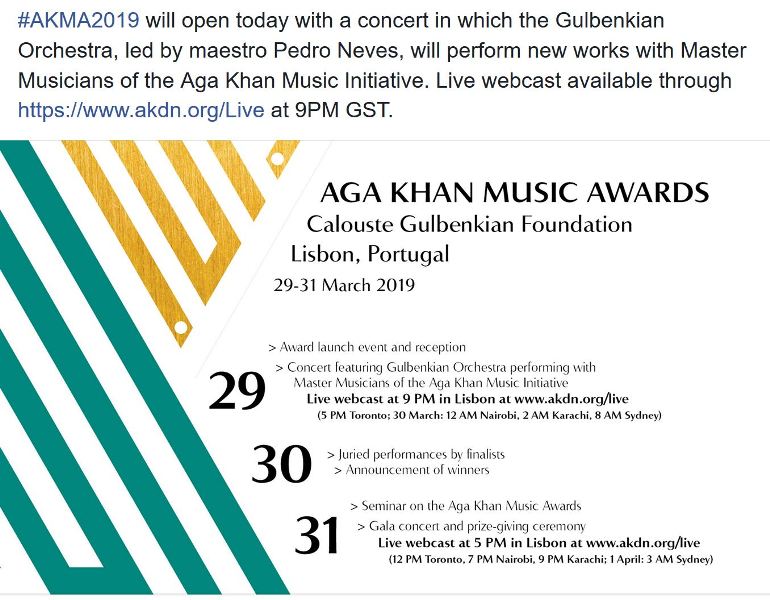
29 March 2019
#AKMA2019 will open today with a concert in which the Gulbenkian Orchestra, led by maestro Pedro Neves, will perform new works with Master Musicians of the Aga Khan Music Initiative. Live webcast available through https://t.co/qEbCzAxXSw at 9PM GST. https://t.co/TVI3LkdgGu

Lisbon , Portugal - 2019, March 29 at the Aga Khan Music Award
LINK FOR VIDEO SPEECH OF PRINCE AMYN AGA KHAN:
http://ismaili.net/timeline/2019/2019-0 ... speech.mp4
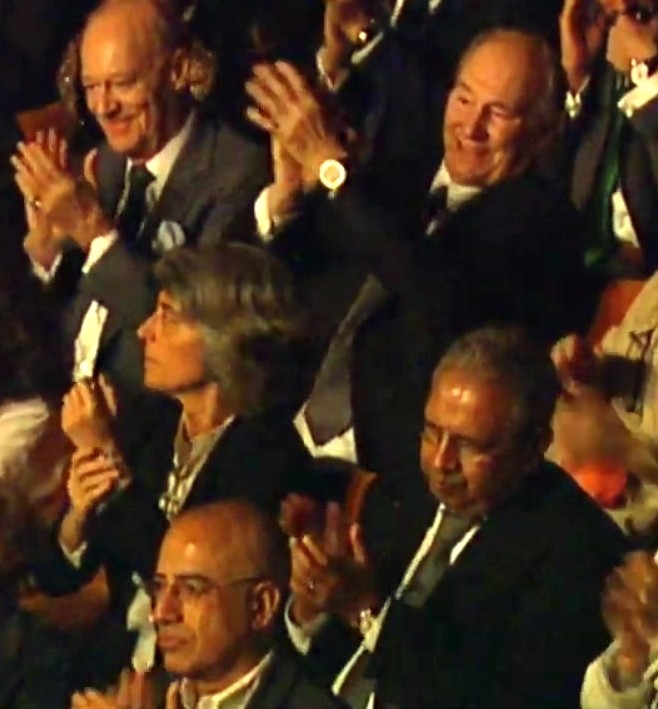
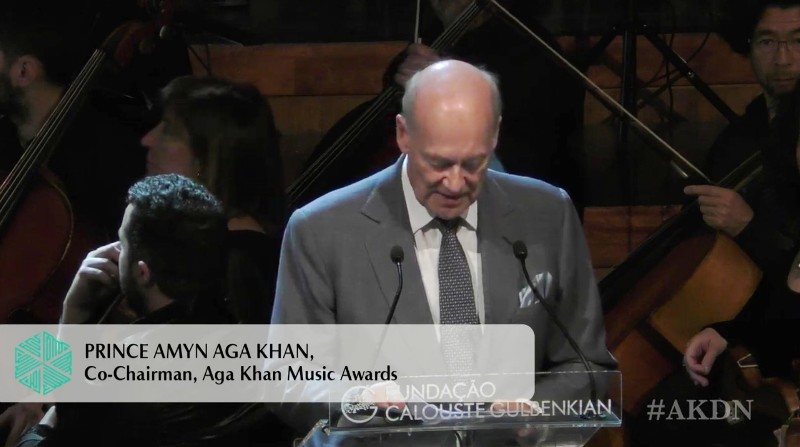
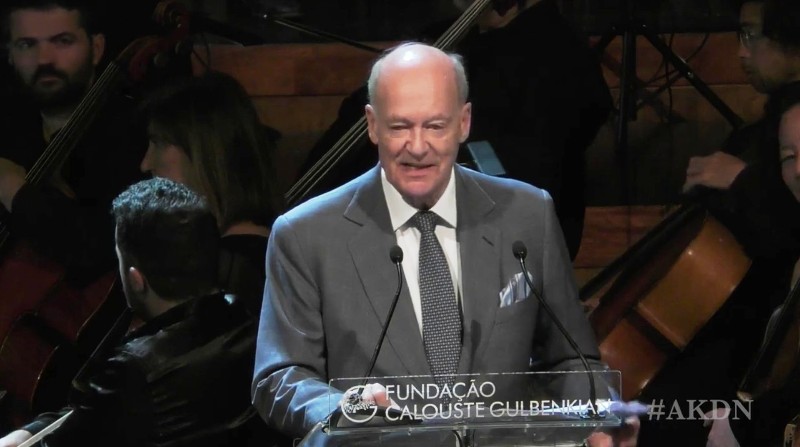
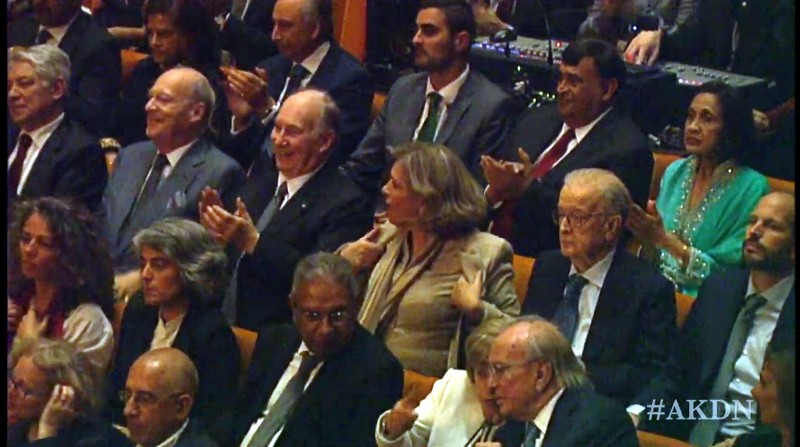
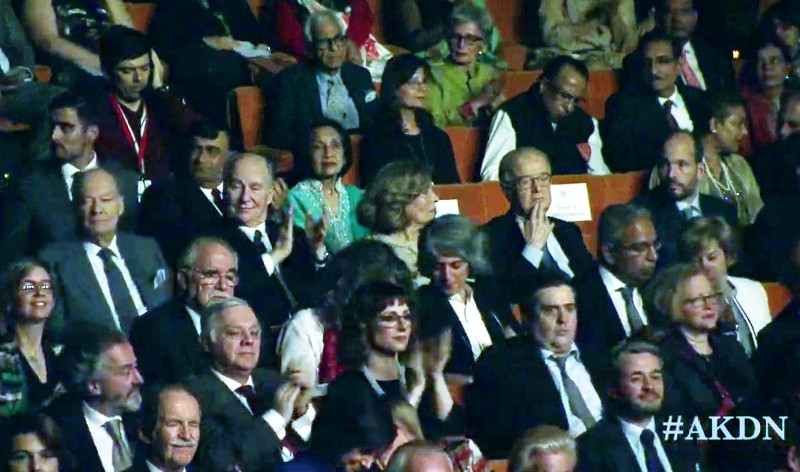
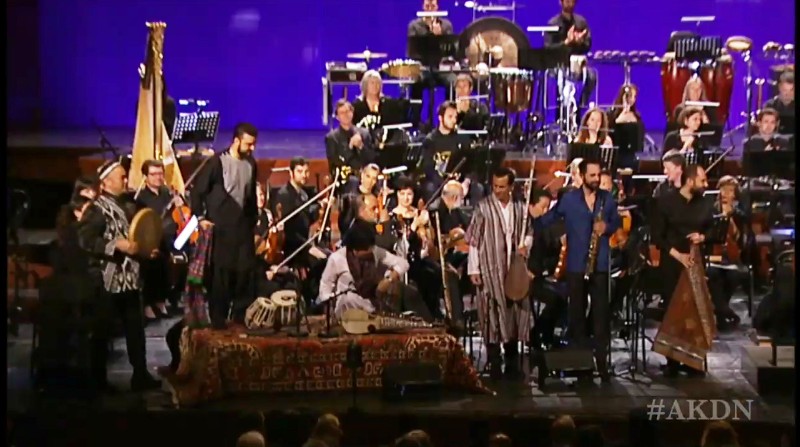
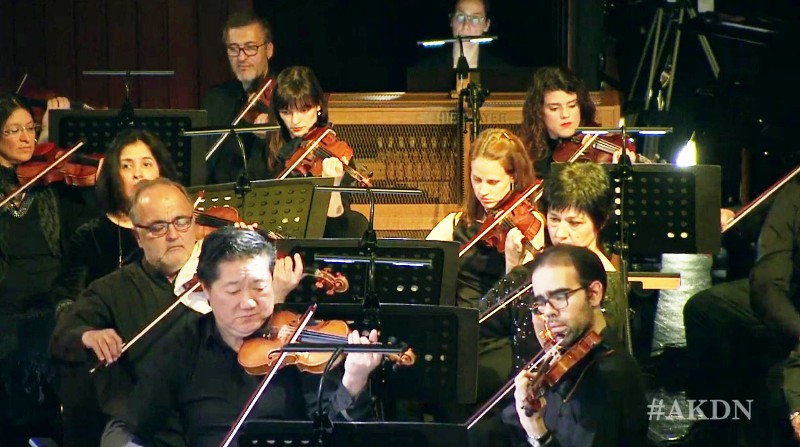
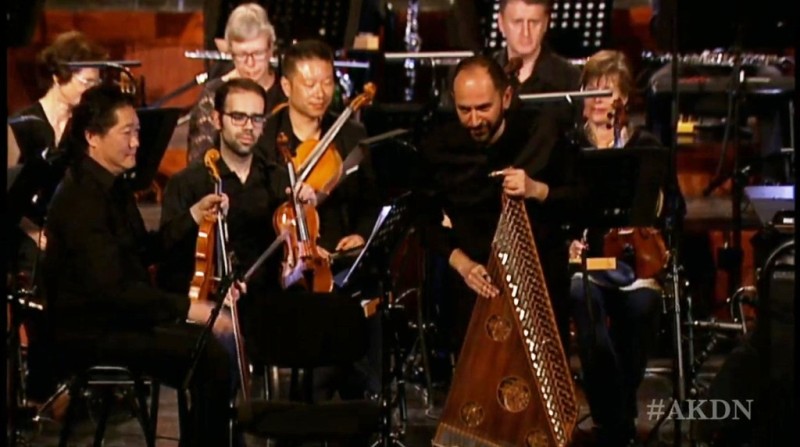
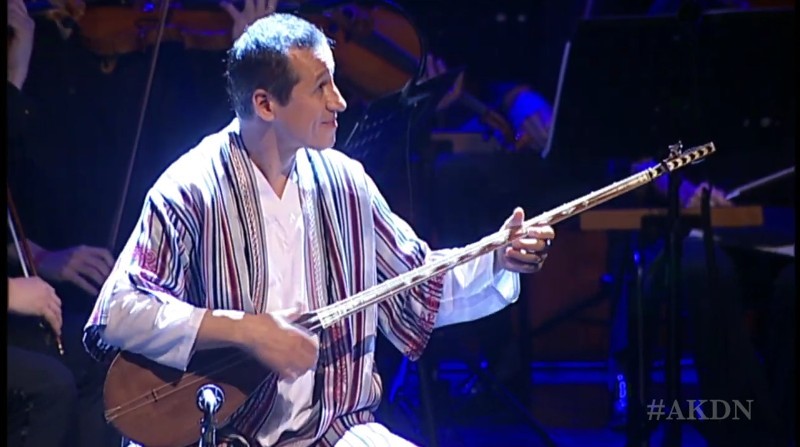
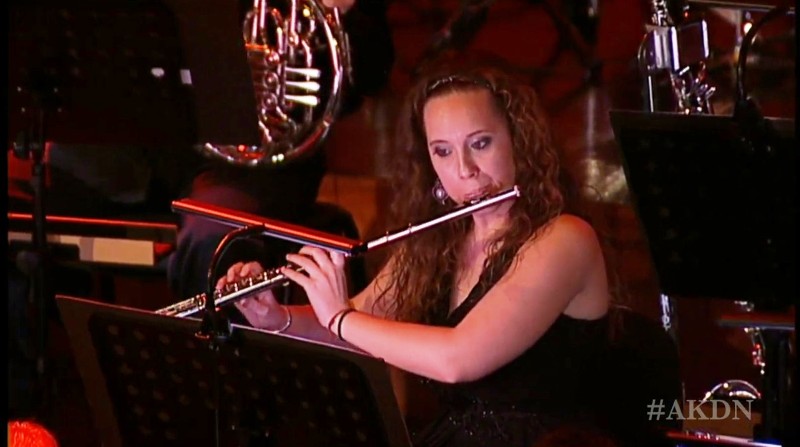
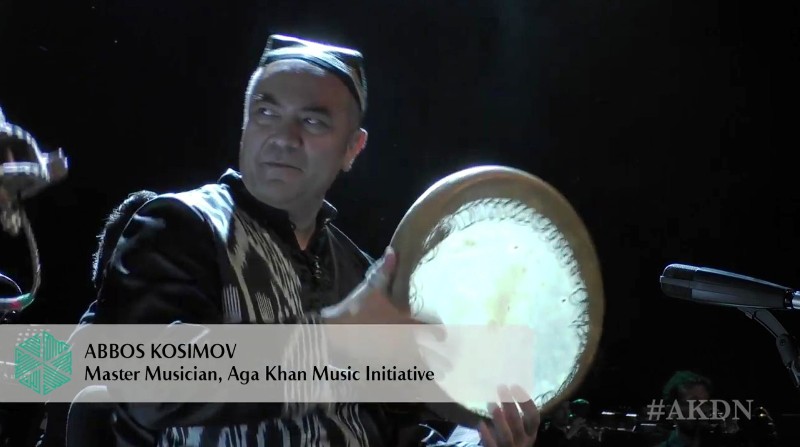
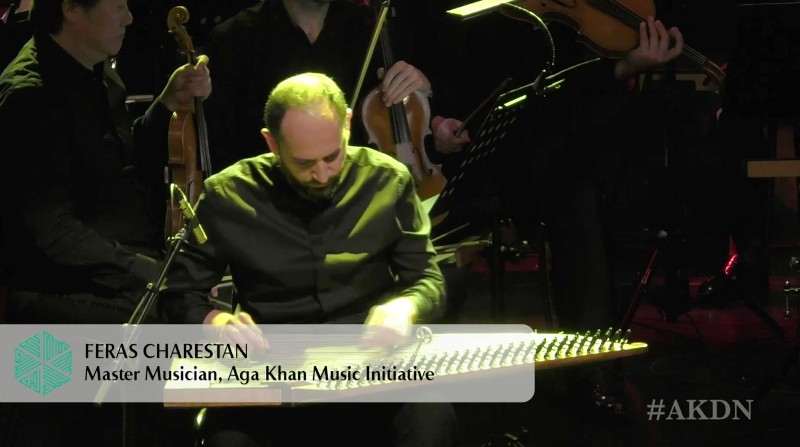
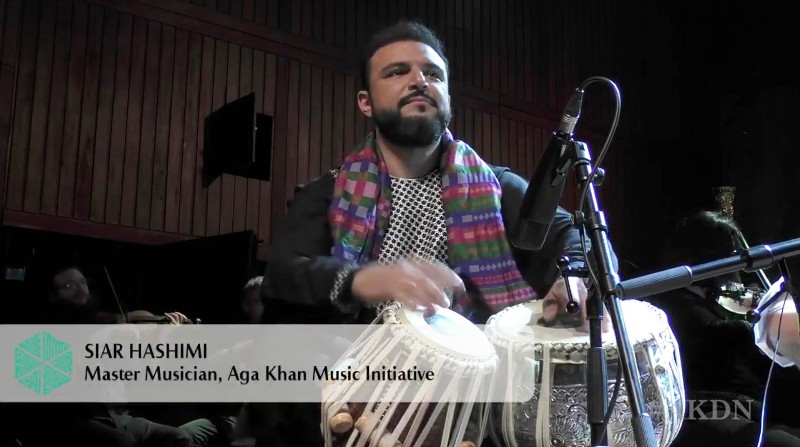
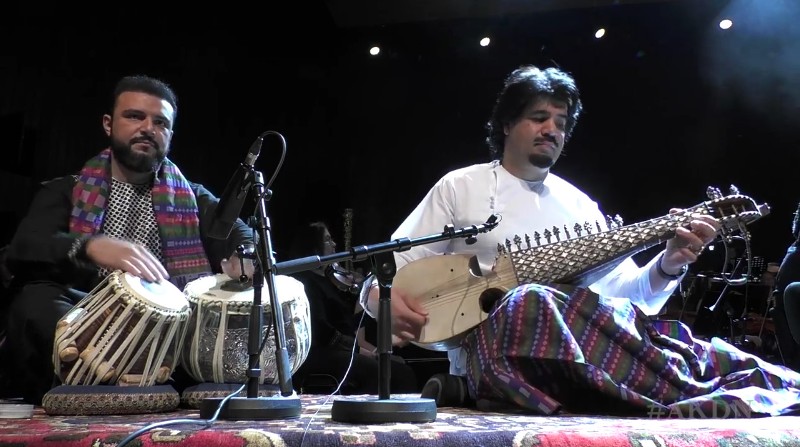
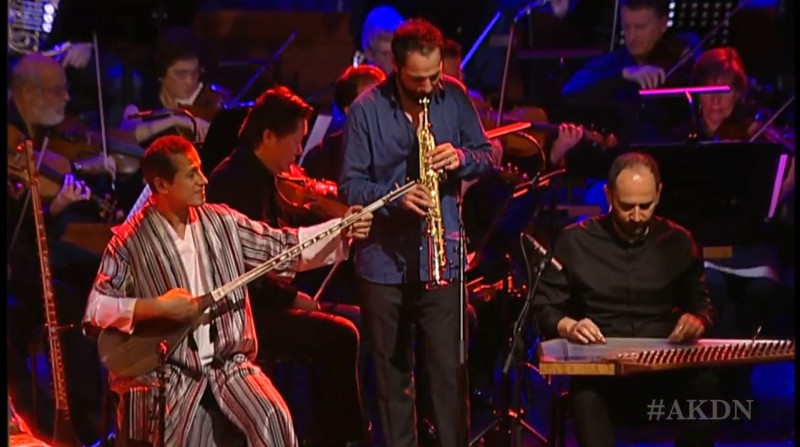
LINK FOR VIDEO SPEECH OF PRINCE AMYN AGA KHAN:
http://ismaili.net/timeline/2019/2019-0 ... speech.mp4















2019, March 29 at the launch of the Aga Khan Music Award in Lisbon, when the program ended and everyone was leaving, here is a 18 seconds Video that teaches us a lot though the quality is not the best:
Prince Amyn gives a brotherly kiss to Mowlana Hazar (H.H. The Aga Khan) before walking briskly to his car.
http://ismaili.net/timeline/2019/2019-0 ... r-love.mp4
Prince Amyn gives a brotherly kiss to Mowlana Hazar (H.H. The Aga Khan) before walking briskly to his car.
http://ismaili.net/timeline/2019/2019-0 ... r-love.mp4
Inaugural Aga Khan Music Awards opens with eclectic collaboration of sounds
On 29 March, the Gulbenkian Orchestra, led by maestro Pedro Neves, performed new works with Master Musicians of the Aga Khan Music Initiative from Tajikistan, Syria, and Afghanistan, in the presence of Mawlana Hazar Imam and members of his family.
Mawlana Hazar Imam was accompanied by Prince Amyn, Prince Hussain, and Prince Aly Muhammad at the concert, which celebrated the diversity of artistic expression through music. Also in attendance were distinguished guests including the former President of the Portuguese Republic Dr Jorge Sampaio, and the former Prime Minister of Portugal Dr Francisco Pinto Balsemão.
The Master Musicians are a collective of artists who create new music inspired by their deep roots in the cultural heritage of the Middle East and Mediterranean Basin, and South and Central Asia. They are venerated performers and composer-arrangers who appear on the world’s most prestigious stages, while also serving as teachers, mentors, and curators, who enrich the Music Initiative’s interregional network of education programmes.
Linking countries and continents, and present and past through explorations of diverse forms of classical, folk, jazz, and contemporary concert music, the ensemble contributes strongly to the Music Initiative’s mission to invigorate cultural and intellectual pluralism in the nations it serves.
In his remarks to introduce the concert, Prince Amyn spoke of the importance of music in today’s society.
“At a time when strengthening tolerance and pluralism has become an acute worldwide priority, music is one of the arts which offers a medium for reaching, involving and uniting global audiences by engendering emotions which we all share as human beings,” Prince Amyn said. “I once said that music is made of dreams and the echo of dreams, and I believe mankind shares the same dreams in large measure.”
Prince Amyn also spoke of his aspirations for the Aga Khan Music Awards, saying that he hopes that they should “serve as a catalyst for many future projects that draw on the rich tapestry of Muslim musical heritage while reaching across the boundaries of time, place, and culture, assimilating the traditions and characteristics of other heritages into a global pluralistic sound.”
Isabel Mota, President of the Gulbenkian Foundation, acknowleded the significance of the Awards, calling them “of paramount importance for the recognition of tradition-inspired contemporary music in cultures shaped by Islam.”
“We need a world in which different identities and cultures are respected and where we can share an idea of common good,” Mota said. “The Aga Khan Development Network, through the Aga Khan Foundation in Portugal, and the Calouste Gulbenkian Foundation have been strategic partners for decades, in different domains, especially in the social arena, but also in the arts and its ability to foster more inclusive and tolerant societies.”
A reception was held prior to the concert where the CEO of CTT (Portugal Postal Services) Francisco Lacerda unveiled a special commemorative stamp in honour of the Awards.
Photos at:
https://the.ismaili/news/inaugural-aga- ... ion-sounds
On 29 March, the Gulbenkian Orchestra, led by maestro Pedro Neves, performed new works with Master Musicians of the Aga Khan Music Initiative from Tajikistan, Syria, and Afghanistan, in the presence of Mawlana Hazar Imam and members of his family.
Mawlana Hazar Imam was accompanied by Prince Amyn, Prince Hussain, and Prince Aly Muhammad at the concert, which celebrated the diversity of artistic expression through music. Also in attendance were distinguished guests including the former President of the Portuguese Republic Dr Jorge Sampaio, and the former Prime Minister of Portugal Dr Francisco Pinto Balsemão.
The Master Musicians are a collective of artists who create new music inspired by their deep roots in the cultural heritage of the Middle East and Mediterranean Basin, and South and Central Asia. They are venerated performers and composer-arrangers who appear on the world’s most prestigious stages, while also serving as teachers, mentors, and curators, who enrich the Music Initiative’s interregional network of education programmes.
Linking countries and continents, and present and past through explorations of diverse forms of classical, folk, jazz, and contemporary concert music, the ensemble contributes strongly to the Music Initiative’s mission to invigorate cultural and intellectual pluralism in the nations it serves.
In his remarks to introduce the concert, Prince Amyn spoke of the importance of music in today’s society.
“At a time when strengthening tolerance and pluralism has become an acute worldwide priority, music is one of the arts which offers a medium for reaching, involving and uniting global audiences by engendering emotions which we all share as human beings,” Prince Amyn said. “I once said that music is made of dreams and the echo of dreams, and I believe mankind shares the same dreams in large measure.”
Prince Amyn also spoke of his aspirations for the Aga Khan Music Awards, saying that he hopes that they should “serve as a catalyst for many future projects that draw on the rich tapestry of Muslim musical heritage while reaching across the boundaries of time, place, and culture, assimilating the traditions and characteristics of other heritages into a global pluralistic sound.”
Isabel Mota, President of the Gulbenkian Foundation, acknowleded the significance of the Awards, calling them “of paramount importance for the recognition of tradition-inspired contemporary music in cultures shaped by Islam.”
“We need a world in which different identities and cultures are respected and where we can share an idea of common good,” Mota said. “The Aga Khan Development Network, through the Aga Khan Foundation in Portugal, and the Calouste Gulbenkian Foundation have been strategic partners for decades, in different domains, especially in the social arena, but also in the arts and its ability to foster more inclusive and tolerant societies.”
A reception was held prior to the concert where the CEO of CTT (Portugal Postal Services) Francisco Lacerda unveiled a special commemorative stamp in honour of the Awards.
Photos at:
https://the.ismaili/news/inaugural-aga- ... ion-sounds
2019 AGA KHAN MUSIC AWARDS LAUREATES AND FINALISTS ANNOUNCED
More - facts and bios
https://www.akdn.org/akma-award-cycle/2018-2019-cycle
More - facts and bios
https://www.akdn.org/akma-award-cycle/2018-2019-cycle
https://www.thenational.ae/arts-culture ... t-1.842999
Abu Dhabi, UAE
Sunday 31 March 2019
Aga Khan Music Awards: a guide to the Arab finalists at this inaugural event
The competition has begun in Lisbon, Portugal. These are the Arabic musicians and nominees you need to know about
The inaugural Aga Khan Music Awards began last night with a high-profile opening ceremony in the Portuguese capital, Lisbon.
The Aga Khan, the spiritual leader of the Ismaili Muslim community and the award's benefactor, led a delegation from the royal family and a selection of Portuguese government ministers in attending the event, which was held in Lisbon's famed performance venue The Calouste Gulbenkian Foundation.
Read More
• New $500,000 prize for Islamic music: Lebanon’s Abeer Nehme and Egyptian composer Mustafa Said up for inaugural Aga Khan award
• Lebanese songstress Abeer Nehme: 'I haven't sold out'
• Mustafa Said and the Asil Ensemble take on classical Arab music with a good measure of regional flair
In his opening remarks, Prince Amyn Aga Khan said the awards is a timely reminder of the role arts plays in strengthening society. “Each musical genre and styles remain important in today’s world as they embody music’s traditional role as a source of spiritual enlightenment, model inspiration and social cohesion,” he said.
“At a time when strengthening tolerance and pluralism has become an acute world-wide priority, music is one of the arts which offers a medium for reaching, involving and uniting global audiences by engendering emotions we all share as human beings.
"I once said music is made of dreams and the echoes of dreams, and I believe mankind shares the same dreams in large measure.”
The opening night concert
The stirring address set the scene for an evocative concert that paired the Orquestra Gulbenkian with a range of master musicians from south and central Asia. With all the five pieces of music orchestrally arranged by Uzbekistan’s Dmitri Yanov-Yanovsky, the works attempted to describe his relationship with the region.
A case in point was the wonderfully atmospheric Golden Waves. The orchestra here swayed to the elongated notes of Syrian saxophonist Basel Rajoub. As the composer of the piece, he explained how the work was about “two melodies born of sound and image that are woven together to tell two different stories from the Mediterranean Sea”.
Let the competition begin
With a total of $500,000 (Dh1.83m) in prizes up for grabs, 14 finalists will compete for the prestigious Award in Performance. Each artist will take the stage – over three separate heats – to perform an original work in front of a live audience, as well as the award’s Master Jury, which consists of artists and musicologists.
The Aga Khan, the spiritual leader of the Ismaili Muslim community, attended the opening ceremony of the inaugural Aga Khan Music Award, held in Lisbon, Portugal. For the full story go to https://t.co/M3kcjHOBUj pic.twitter.com/h5NA1nmD71
— Saeed (@SaeedSquared) March 30, 2019
Some of the big names on the panel include David Harrington, the violinist and founder of the revered experimental group Kronos Quartet, and Nouri Iskandar, composer and former director of Syria’s famed conservatory Arab Institute of Music. The panel will announce the winner this evening at 9.30pm Lisbon time, which is 1.30am Sunday morning in the UAE.
A healthy number of the finalists hail from the Arab world.
These include the following:
Nai Barghouti (Palestine)
A Palestinian singer, composer and flautist, Barghouti is viewed as future world music star. She is another graduate of the Edward Said National Conservatory of Music, and she earned praise for her flute compositions, four of which became part of the curriculum at Spain's International Institute of Iberian Music. As well as performing a vocal and flute set at the United Nations headquarters in New York in 2013, she went on to tour the UK with a repertoire that consisted of Arabic classic tunes with a modern jazz twist. She is presently studying jazz performance at Holland's Conservatorium van Amsterdam.
Mustafa Said (Egypt)
Abu Dhabi fans will know Said from his brilliant and sold-out 2014 Abu Dhabi Festival performance as the leader of the Asil Ensemble. Said, who was born blind, learned to read and write music in braille from an early age before studying at Cairo's renowned Arabic Oud House and learning western music composition in correspondence with the US-based Hadley Institute for the Blind and Visually Impaired. Through the Asil Ensemble, Said aims to reintroduce the beauty and the complex musicianship of traditional Arabic music, called Tarab, to a new generation of listeners.
Abeer Nehme (Lebanon)
An artist as well as a scholar, the Lebanese soprano and composer Abeer Nehme has been celebrated for her expansive repertoire, which includes everything from sophisticated Arabic pop to liturgical and traditional music. She has sung in various languages and delivered concerts throughout the Middle East (including Dubai Opera in 2017) as well Europe and North America. She is also the composer of the theme of the Sheikh Zayed Book Award, which will be heard when the award presentation ceremony takes place in Abu Dhabi on April 25.
Ahmed Alkhatib (Palestine)
Born in a Palestinian refugee camp in Jordan, Alkhatib learned the oud under the guidance of Palestinian master Ahmad Abdel Qasem before going on to teach the instrument to a new generation of musicians in Palestine's the Edward Said National Conservatory of Music. That's where he was the head Oriental Music department. Alkhatib presently resides in Sweden where he is a lecturer at the University of Gothenburg’s Academy of Music and Drama.
Huda Asfour (Palestine)
Huda Asfour is an oud and qanoon player who also studied at the Edward Said Music Conservatory, where she was mentored by the acclaimed oud player Khaled Joubran. Asfour is the co-founder of the Jehar project, a regional music collective that aims to “reintroduce tunes that represent our identity, but in new arrangements that represented us as youngsters connected to global music”.
The details
The Aga Khan Music Awards is being held at the Calouste Gulbenkian Foundation in Lisbon, Portugal and runs until March 31. For more information on the award and the full list of nominees go to www.akdn.org/akma. You can also follow The National’s coverage of the award ceremony over the next few days.
Abu Dhabi, UAE
Sunday 31 March 2019
Aga Khan Music Awards: a guide to the Arab finalists at this inaugural event
The competition has begun in Lisbon, Portugal. These are the Arabic musicians and nominees you need to know about
The inaugural Aga Khan Music Awards began last night with a high-profile opening ceremony in the Portuguese capital, Lisbon.
The Aga Khan, the spiritual leader of the Ismaili Muslim community and the award's benefactor, led a delegation from the royal family and a selection of Portuguese government ministers in attending the event, which was held in Lisbon's famed performance venue The Calouste Gulbenkian Foundation.
Read More
• New $500,000 prize for Islamic music: Lebanon’s Abeer Nehme and Egyptian composer Mustafa Said up for inaugural Aga Khan award
• Lebanese songstress Abeer Nehme: 'I haven't sold out'
• Mustafa Said and the Asil Ensemble take on classical Arab music with a good measure of regional flair
In his opening remarks, Prince Amyn Aga Khan said the awards is a timely reminder of the role arts plays in strengthening society. “Each musical genre and styles remain important in today’s world as they embody music’s traditional role as a source of spiritual enlightenment, model inspiration and social cohesion,” he said.
“At a time when strengthening tolerance and pluralism has become an acute world-wide priority, music is one of the arts which offers a medium for reaching, involving and uniting global audiences by engendering emotions we all share as human beings.
"I once said music is made of dreams and the echoes of dreams, and I believe mankind shares the same dreams in large measure.”
The opening night concert
The stirring address set the scene for an evocative concert that paired the Orquestra Gulbenkian with a range of master musicians from south and central Asia. With all the five pieces of music orchestrally arranged by Uzbekistan’s Dmitri Yanov-Yanovsky, the works attempted to describe his relationship with the region.
A case in point was the wonderfully atmospheric Golden Waves. The orchestra here swayed to the elongated notes of Syrian saxophonist Basel Rajoub. As the composer of the piece, he explained how the work was about “two melodies born of sound and image that are woven together to tell two different stories from the Mediterranean Sea”.
Let the competition begin
With a total of $500,000 (Dh1.83m) in prizes up for grabs, 14 finalists will compete for the prestigious Award in Performance. Each artist will take the stage – over three separate heats – to perform an original work in front of a live audience, as well as the award’s Master Jury, which consists of artists and musicologists.
The Aga Khan, the spiritual leader of the Ismaili Muslim community, attended the opening ceremony of the inaugural Aga Khan Music Award, held in Lisbon, Portugal. For the full story go to https://t.co/M3kcjHOBUj pic.twitter.com/h5NA1nmD71
— Saeed (@SaeedSquared) March 30, 2019
Some of the big names on the panel include David Harrington, the violinist and founder of the revered experimental group Kronos Quartet, and Nouri Iskandar, composer and former director of Syria’s famed conservatory Arab Institute of Music. The panel will announce the winner this evening at 9.30pm Lisbon time, which is 1.30am Sunday morning in the UAE.
A healthy number of the finalists hail from the Arab world.
These include the following:
Nai Barghouti (Palestine)
A Palestinian singer, composer and flautist, Barghouti is viewed as future world music star. She is another graduate of the Edward Said National Conservatory of Music, and she earned praise for her flute compositions, four of which became part of the curriculum at Spain's International Institute of Iberian Music. As well as performing a vocal and flute set at the United Nations headquarters in New York in 2013, she went on to tour the UK with a repertoire that consisted of Arabic classic tunes with a modern jazz twist. She is presently studying jazz performance at Holland's Conservatorium van Amsterdam.
Mustafa Said (Egypt)
Abu Dhabi fans will know Said from his brilliant and sold-out 2014 Abu Dhabi Festival performance as the leader of the Asil Ensemble. Said, who was born blind, learned to read and write music in braille from an early age before studying at Cairo's renowned Arabic Oud House and learning western music composition in correspondence with the US-based Hadley Institute for the Blind and Visually Impaired. Through the Asil Ensemble, Said aims to reintroduce the beauty and the complex musicianship of traditional Arabic music, called Tarab, to a new generation of listeners.
Abeer Nehme (Lebanon)
An artist as well as a scholar, the Lebanese soprano and composer Abeer Nehme has been celebrated for her expansive repertoire, which includes everything from sophisticated Arabic pop to liturgical and traditional music. She has sung in various languages and delivered concerts throughout the Middle East (including Dubai Opera in 2017) as well Europe and North America. She is also the composer of the theme of the Sheikh Zayed Book Award, which will be heard when the award presentation ceremony takes place in Abu Dhabi on April 25.
Ahmed Alkhatib (Palestine)
Born in a Palestinian refugee camp in Jordan, Alkhatib learned the oud under the guidance of Palestinian master Ahmad Abdel Qasem before going on to teach the instrument to a new generation of musicians in Palestine's the Edward Said National Conservatory of Music. That's where he was the head Oriental Music department. Alkhatib presently resides in Sweden where he is a lecturer at the University of Gothenburg’s Academy of Music and Drama.
Huda Asfour (Palestine)
Huda Asfour is an oud and qanoon player who also studied at the Edward Said Music Conservatory, where she was mentored by the acclaimed oud player Khaled Joubran. Asfour is the co-founder of the Jehar project, a regional music collective that aims to “reintroduce tunes that represent our identity, but in new arrangements that represented us as youngsters connected to global music”.
The details
The Aga Khan Music Awards is being held at the Calouste Gulbenkian Foundation in Lisbon, Portugal and runs until March 31. For more information on the award and the full list of nominees go to www.akdn.org/akma. You can also follow The National’s coverage of the award ceremony over the next few days.
http://english.ahram.org.eg/NewsContent ... han-d.aspx
'Music binds people together': Prince Amyn Aga Khan during celebration of music awards in Lisbon
The Aga Khan Music Initiative launched its first-ever music awards with a grand gala held at the Calouste Gulbenkian centre in Lisbon, Portugal on Friday
Ati Metwaly , Saturday 30 Mar 2019
At a grand ceremony on Friday at the Calouste Gulbenkian Museum in Lisbon, the Aga Khan Music Initiative launched the first-ever edition of the Aga Khan Music Awards.
The inaugural celebrations are taking place over three days, continuing until Sunday, and act as a meeting forum for artists from the Middle East, North Africa and Middle East, regionally renowned cultural players including the directors of the festivals held across the mentioned regions, and promoters of arts, culture and artistic education in the region, among others.
The celebrations opened on 29 March with a meeting of renowned names from the cultural field and authorities from various countries involved in Aga Khan activities.
Following the grand reception, guests moved to the large theatre hall located inside the Calouste Gulbenkian Museum where the Gulbenkian Orchestra conducted by Pedro Neves featured the master musicians of the Aga Khan Music Initiative.
Introducing the concert and the music awards, his highness Prince Amyn Aga Khan, the brother of Aga Khan, the main dynamo behind all Aga Khan Foundation’s activities, pointed to the choice of Lisbon as a perfect location for launching the Aga Khan Music Awards.
“Portugal is a shining example of a pluralistic society, united in its diversity,” he said in an address, adding that the same diversity is celebrated through the Aga Khan Music Awards .
He went on to underline the mission of the newly launched initiative saying: “the award aims to recognise an exceptional creativity, promise, the musical performance,” yet another aspect of the already two decades-old involvement of Aga Khan in the development and preservation of regional music and its values.
“When my brother launched the music initiative, back then it focused on Asia where it played an important preservation role, something that was very needed in the face of either neglect or repression (in the times of Soviet Union’s power over the then Soviet republics),” Prince Amyn Aga Khan said.
In fact since 2000, the Aga Khan Music Initiative (part of Aga Khan Trust for Culture) – an interregional music development programme that operates in the sectors of education, documentation and performance – has supported, brought to light, developed and educated through music a multitude of communities in Asia, North Africa and the Middle East.
Aga Khan’s educational interventions have created a strong impact in countries such as Afghanistan, Kazakhstan, Kyrgyzstan, Pakistan, Tajikistan, Mali and Egypt.
Aga Khan
Master Musicians of the Aga Khan Music Initiative, accompanied by the Gulbenkian Orchestra under the baton of Pedro Neves (Photo: courtesy of AKMA/ AKDN)
The Aga Khan Music Awards are just an additional element of these diverse activities, with the focus on recognition of the values transmitted by the musicians.
“Music’s power of communication is special, enormous and universal. It binds people together and unites them.” the prince explained.
Aga Khan’s role in the region’s music development is unprecedentedly large. Over the past years many music centres have been established and music education introduced to communities across Asia, North Africa and the Middle East. There have also been preservation efforts aimed at traditional instruments and music.
With time, the musicians who benefited from Aga Khan’s network have become in demand performers, a fact that have significantly improved their lives. Traditional musicians have also begun exploring new territories creating interesting multi-cultural dialogues, joining their heritage with different vocabularies of contemporary musical expressions.
In addition, many of the beneficiaries of Aga Khan Music Initiative have now become regionally and/or internationally renowned musicians and promoters of the cultural values of their respective countries.
The opening concert featured the Master Musicians of the Aga Khan Music Initiative, the musicians who are also the “leading collaborators – venerated and composers-arrangers who appear on the world’s most prestigious stages while also serving as teachers, mentors and curators who enrich the Music Initiative’s interregional network of educational programmes,” explains the concert’s brochure.
The Gulbenkian Orchestra was conducted by Pedro Neves, who is also a principal conductor of the Ephinho Classic Orchestra, and has been a guest conductor of numerous Portuguese and international orchestras.
The featured musicians soloists and/or composers included Sirojiddin Juraev, a Tajikistani performer on a variety of long-necked lutes from Central Asia, in his own Suite for Dutar and Orchestra; saxophonist Basel Rajoub from Syria in his Golden Waves; Syrian Feras Charestan’s composition Samai which he played on qanoun.
The evening continued with “Rangin Kaman”, a composition by Hamayoun Sakhi, an Afghan rubab player who was joined by Uzbekistani Abbos Kosimov, a doria player and a table player, Siar Hashimi from Afghanistan.
The final work, titled Tashkent and composed by Rajoub, brought together Rajoub on saxophone, Charestan on qanoun, Juraev on dutar and Kosimov on doria.
In this melting pot of cultures, nationalities and musical belongings, the evening was a perfect showcase of Aga Khan Initiative’s mission to reinvigorate the intellectual wealth of all the nations touched by the foundation.
It is on the stage that we saw living proof of how a diversity and plurality can generate a unique unity, where on the one hand the traditional values are brought to light and on the other hand they create new connections with many diverse music forms, such as jazz or contemporary music.
The celebration continues with performances held by the 14 nominees in the Performance Category at the inaugural edition of the Aga Khan Music Awards, and the final gala during which the winners will be revealed.
Awards will also be handed out to the already announced winners of a number of other categories announced last week: music creation; education; social inclusion; preservation, revitalisation, dissemination of music; and distinguished and enduring contributions to music.
For more arts and culture news and updates, follow Ahram Online Arts and Culture on Twitter at @AhramOnlineArts and on Facebook at Ahram Online: Arts & Culture
-
'Music binds people together': Prince Amyn Aga Khan during celebration of music awards in Lisbon
The Aga Khan Music Initiative launched its first-ever music awards with a grand gala held at the Calouste Gulbenkian centre in Lisbon, Portugal on Friday
Ati Metwaly , Saturday 30 Mar 2019
At a grand ceremony on Friday at the Calouste Gulbenkian Museum in Lisbon, the Aga Khan Music Initiative launched the first-ever edition of the Aga Khan Music Awards.
The inaugural celebrations are taking place over three days, continuing until Sunday, and act as a meeting forum for artists from the Middle East, North Africa and Middle East, regionally renowned cultural players including the directors of the festivals held across the mentioned regions, and promoters of arts, culture and artistic education in the region, among others.
The celebrations opened on 29 March with a meeting of renowned names from the cultural field and authorities from various countries involved in Aga Khan activities.
Following the grand reception, guests moved to the large theatre hall located inside the Calouste Gulbenkian Museum where the Gulbenkian Orchestra conducted by Pedro Neves featured the master musicians of the Aga Khan Music Initiative.
Introducing the concert and the music awards, his highness Prince Amyn Aga Khan, the brother of Aga Khan, the main dynamo behind all Aga Khan Foundation’s activities, pointed to the choice of Lisbon as a perfect location for launching the Aga Khan Music Awards.
“Portugal is a shining example of a pluralistic society, united in its diversity,” he said in an address, adding that the same diversity is celebrated through the Aga Khan Music Awards .
He went on to underline the mission of the newly launched initiative saying: “the award aims to recognise an exceptional creativity, promise, the musical performance,” yet another aspect of the already two decades-old involvement of Aga Khan in the development and preservation of regional music and its values.
“When my brother launched the music initiative, back then it focused on Asia where it played an important preservation role, something that was very needed in the face of either neglect or repression (in the times of Soviet Union’s power over the then Soviet republics),” Prince Amyn Aga Khan said.
In fact since 2000, the Aga Khan Music Initiative (part of Aga Khan Trust for Culture) – an interregional music development programme that operates in the sectors of education, documentation and performance – has supported, brought to light, developed and educated through music a multitude of communities in Asia, North Africa and the Middle East.
Aga Khan’s educational interventions have created a strong impact in countries such as Afghanistan, Kazakhstan, Kyrgyzstan, Pakistan, Tajikistan, Mali and Egypt.
Aga Khan
Master Musicians of the Aga Khan Music Initiative, accompanied by the Gulbenkian Orchestra under the baton of Pedro Neves (Photo: courtesy of AKMA/ AKDN)
The Aga Khan Music Awards are just an additional element of these diverse activities, with the focus on recognition of the values transmitted by the musicians.
“Music’s power of communication is special, enormous and universal. It binds people together and unites them.” the prince explained.
Aga Khan’s role in the region’s music development is unprecedentedly large. Over the past years many music centres have been established and music education introduced to communities across Asia, North Africa and the Middle East. There have also been preservation efforts aimed at traditional instruments and music.
With time, the musicians who benefited from Aga Khan’s network have become in demand performers, a fact that have significantly improved their lives. Traditional musicians have also begun exploring new territories creating interesting multi-cultural dialogues, joining their heritage with different vocabularies of contemporary musical expressions.
In addition, many of the beneficiaries of Aga Khan Music Initiative have now become regionally and/or internationally renowned musicians and promoters of the cultural values of their respective countries.
The opening concert featured the Master Musicians of the Aga Khan Music Initiative, the musicians who are also the “leading collaborators – venerated and composers-arrangers who appear on the world’s most prestigious stages while also serving as teachers, mentors and curators who enrich the Music Initiative’s interregional network of educational programmes,” explains the concert’s brochure.
The Gulbenkian Orchestra was conducted by Pedro Neves, who is also a principal conductor of the Ephinho Classic Orchestra, and has been a guest conductor of numerous Portuguese and international orchestras.
The featured musicians soloists and/or composers included Sirojiddin Juraev, a Tajikistani performer on a variety of long-necked lutes from Central Asia, in his own Suite for Dutar and Orchestra; saxophonist Basel Rajoub from Syria in his Golden Waves; Syrian Feras Charestan’s composition Samai which he played on qanoun.
The evening continued with “Rangin Kaman”, a composition by Hamayoun Sakhi, an Afghan rubab player who was joined by Uzbekistani Abbos Kosimov, a doria player and a table player, Siar Hashimi from Afghanistan.
The final work, titled Tashkent and composed by Rajoub, brought together Rajoub on saxophone, Charestan on qanoun, Juraev on dutar and Kosimov on doria.
In this melting pot of cultures, nationalities and musical belongings, the evening was a perfect showcase of Aga Khan Initiative’s mission to reinvigorate the intellectual wealth of all the nations touched by the foundation.
It is on the stage that we saw living proof of how a diversity and plurality can generate a unique unity, where on the one hand the traditional values are brought to light and on the other hand they create new connections with many diverse music forms, such as jazz or contemporary music.
The celebration continues with performances held by the 14 nominees in the Performance Category at the inaugural edition of the Aga Khan Music Awards, and the final gala during which the winners will be revealed.
Awards will also be handed out to the already announced winners of a number of other categories announced last week: music creation; education; social inclusion; preservation, revitalisation, dissemination of music; and distinguished and enduring contributions to music.
For more arts and culture news and updates, follow Ahram Online Arts and Culture on Twitter at @AhramOnlineArts and on Facebook at Ahram Online: Arts & Culture
-
2019, March 29: Lisbon, Portugal
A commemorative stamp was unveiled on the occasion of the Aga Khan Music Awards by His Highness the Aga Khan, Isabel Mota, President of the Calouste Gulbenkian Foundation, Prince Amyn Aga Khan, and Francisco Lacerda, CEO of the CTT (Portuguese Postal Services). Photo: AKDN / Akbar Hakim
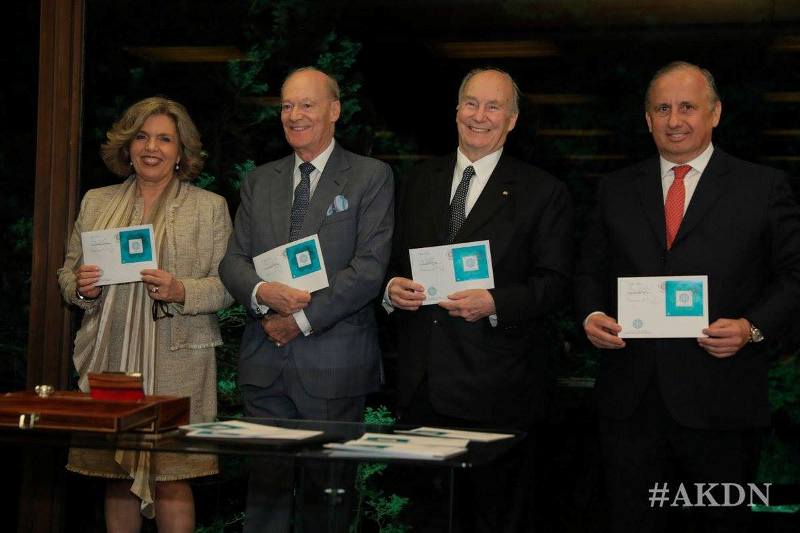
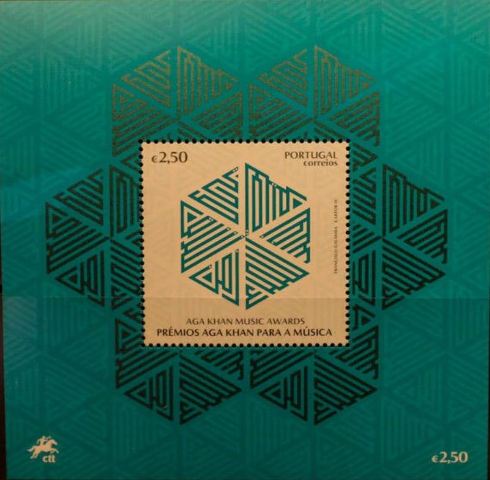
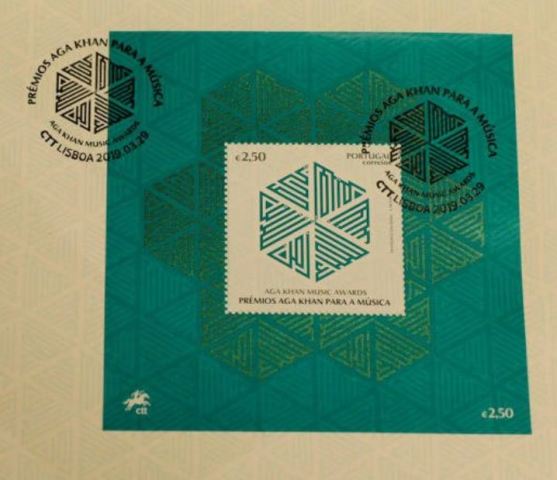
A commemorative stamp was unveiled on the occasion of the Aga Khan Music Awards by His Highness the Aga Khan, Isabel Mota, President of the Calouste Gulbenkian Foundation, Prince Amyn Aga Khan, and Francisco Lacerda, CEO of the CTT (Portuguese Postal Services). Photo: AKDN / Akbar Hakim



Last edited by Admin on Sun Mar 31, 2019 11:00 pm, edited 2 times in total.
2019, March 30:
Aga Khan Music Awards, the event continues for a second day. More photos from the first day as well as photos of this 30th March 2019 have arrived. Members of the nurani family, Prince Amyn, Prince Hussein, Prince Aly-Muhammad, Princess Farheen have all supported our Imam in this venture.
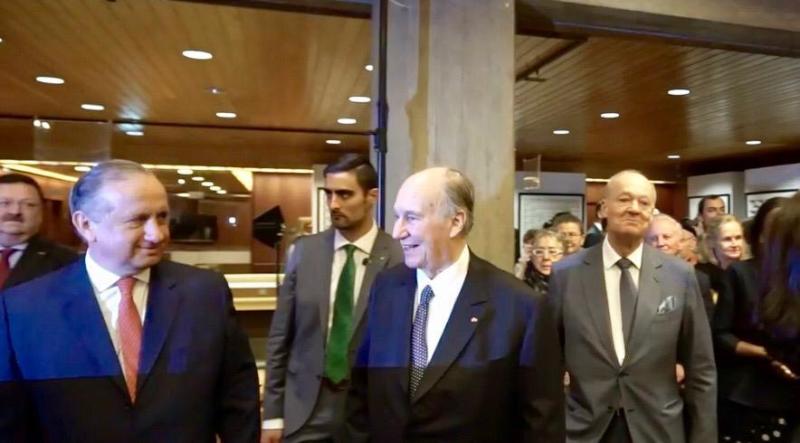
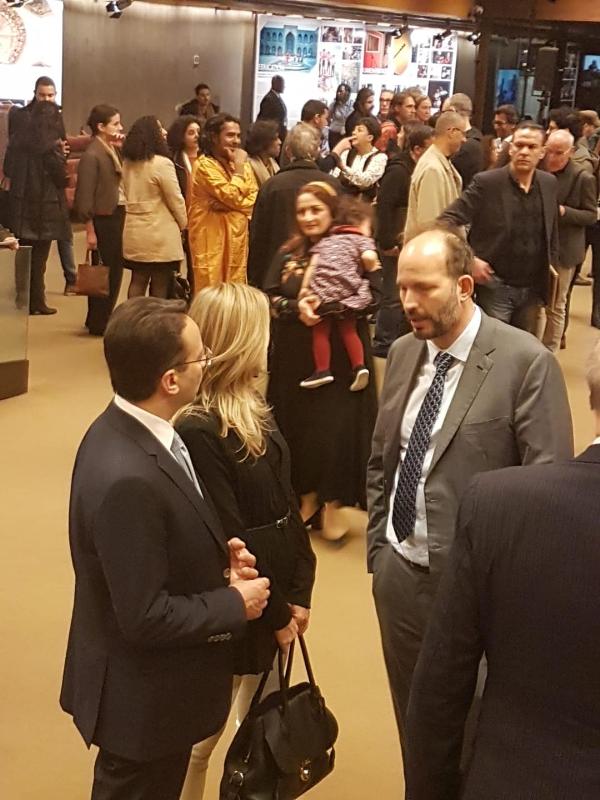
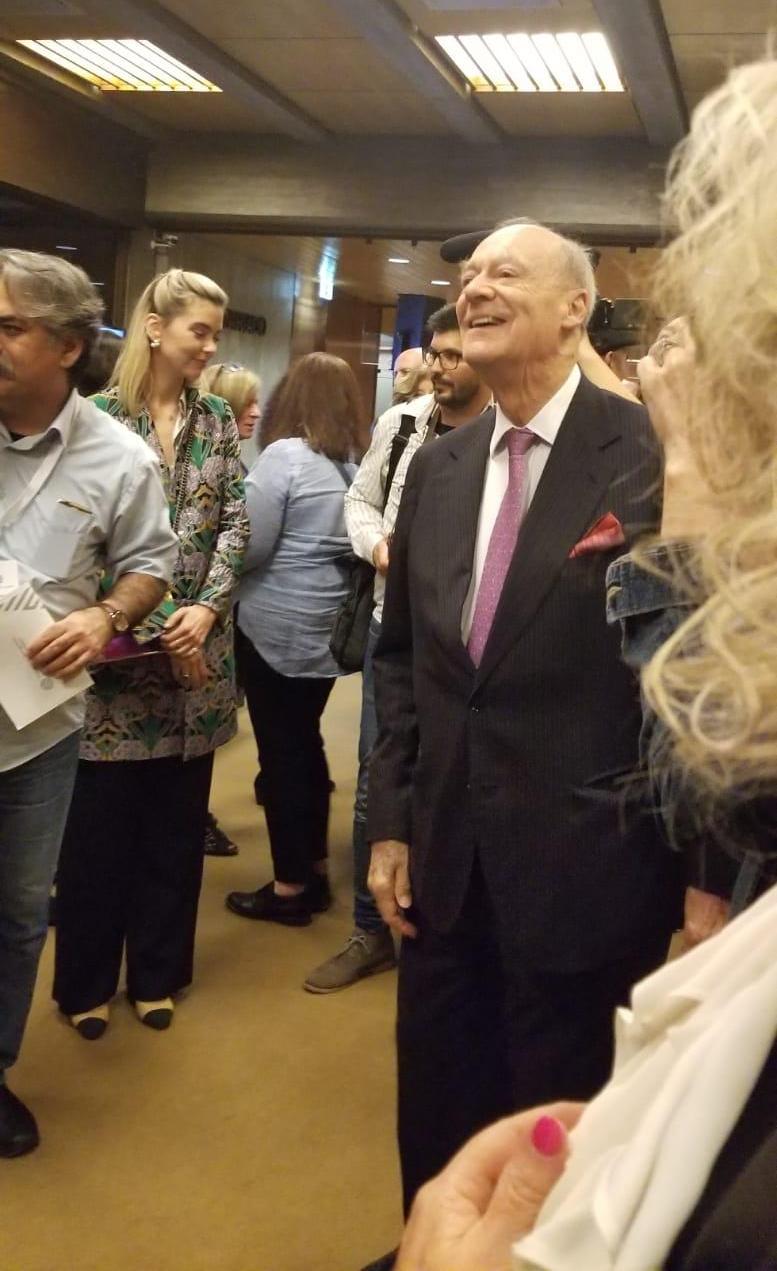
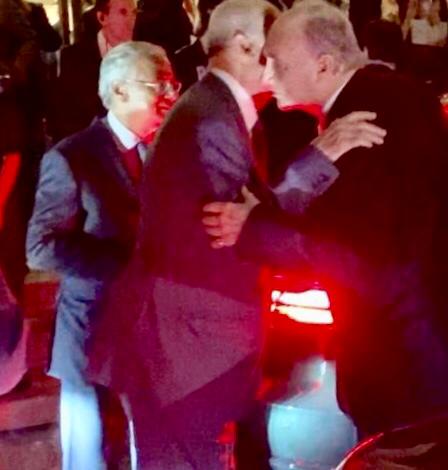
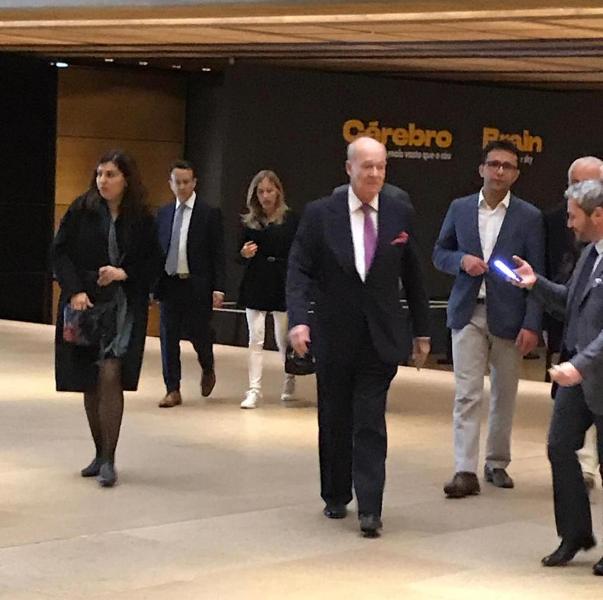
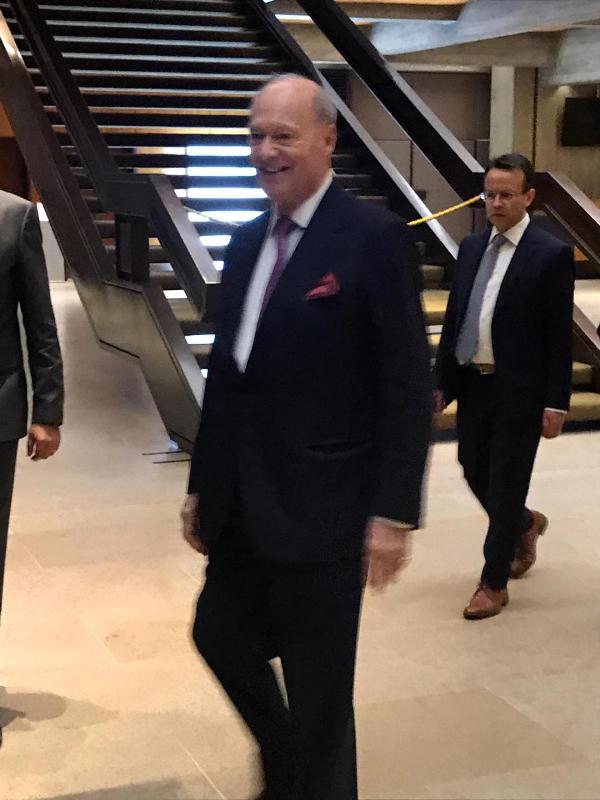
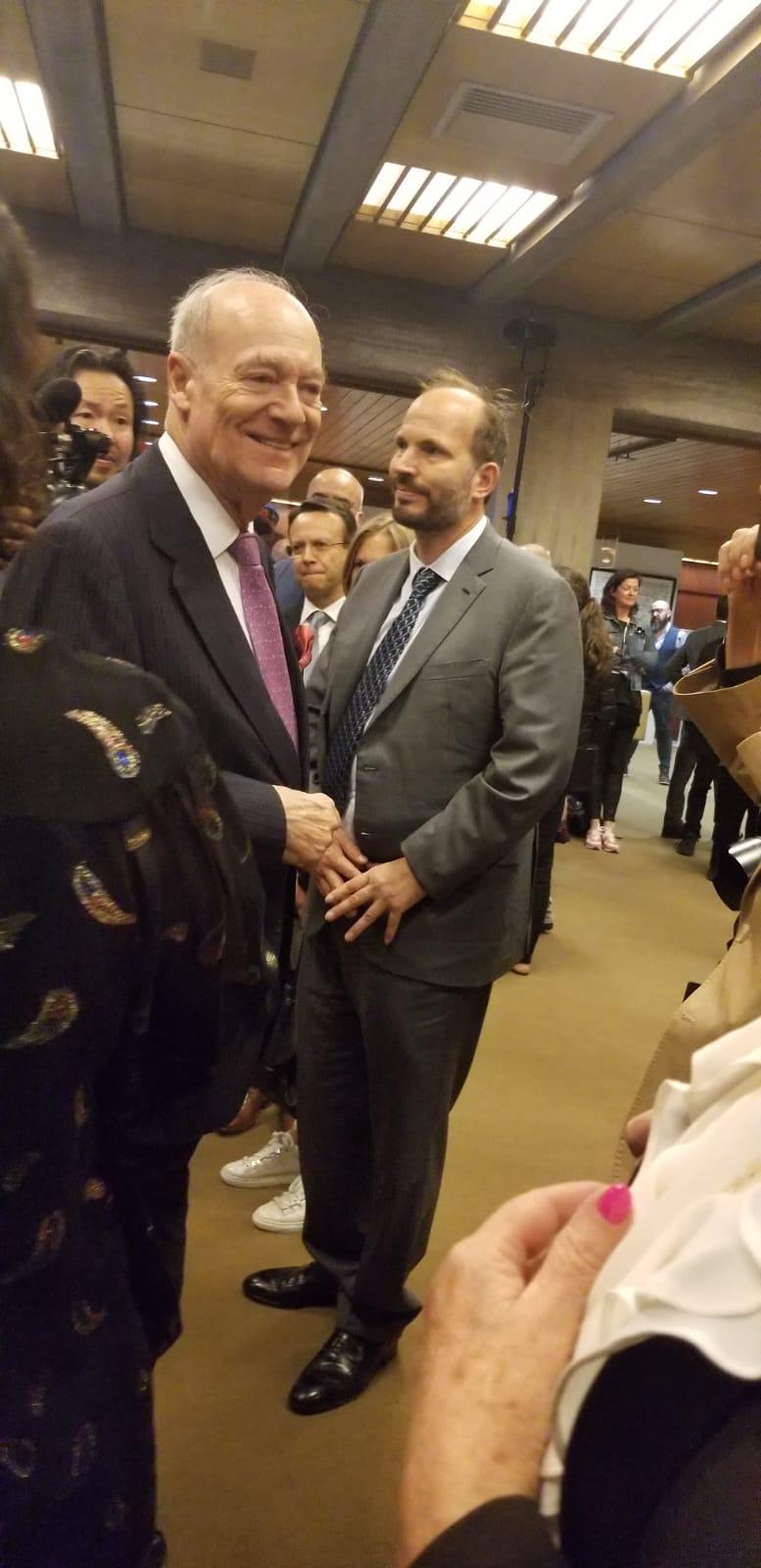
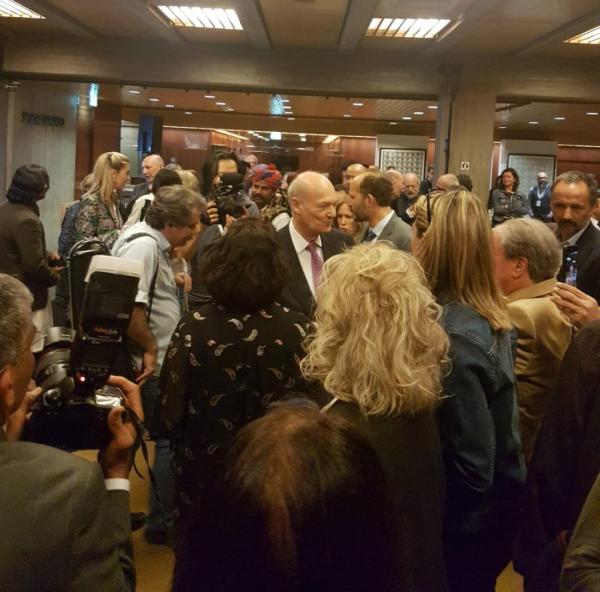
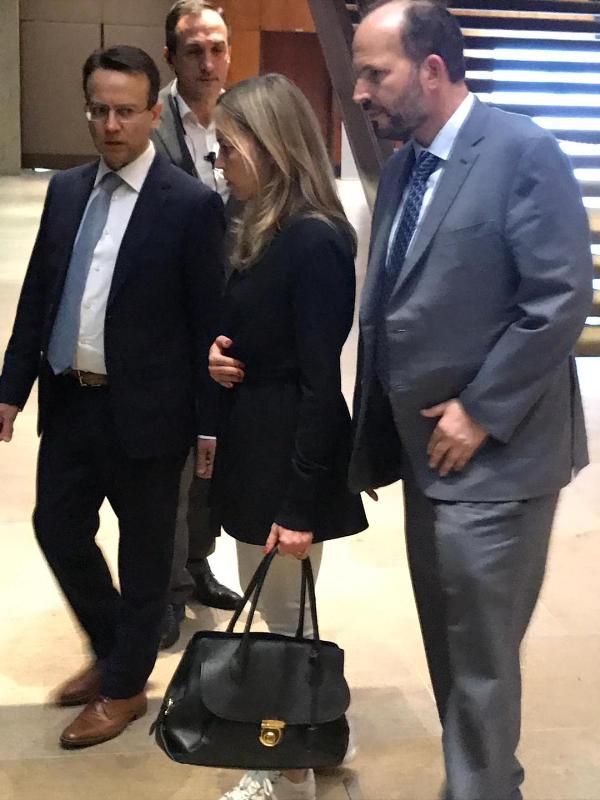
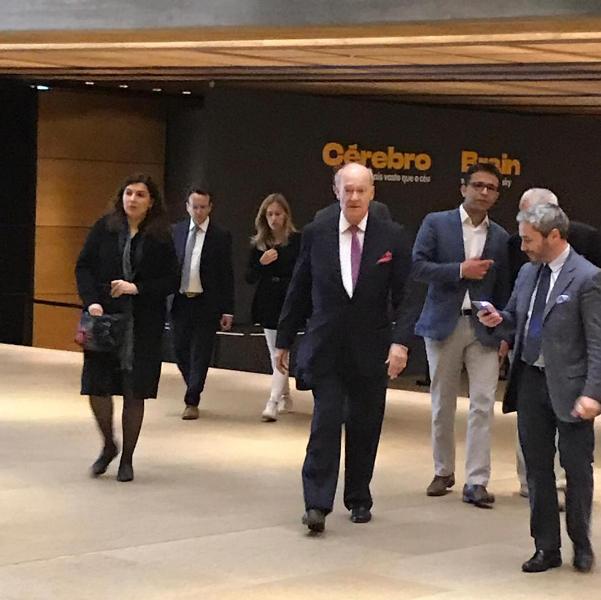
Aga Khan Music Awards, the event continues for a second day. More photos from the first day as well as photos of this 30th March 2019 have arrived. Members of the nurani family, Prince Amyn, Prince Hussein, Prince Aly-Muhammad, Princess Farheen have all supported our Imam in this venture.










Aga Khan Music Awards’ inaugural Seminar hosted in Lisbon
On the third day of the inaugural Aga Khan Music Awards, eminent figures in the realm of arts and music came together to participate in discussions relating to the concept, vision, and impact of the Awards. The Seminar was attended by Mawlana Hazar Imam, Prince Amyn, Prince Hussain, and Prince Aly Muhammad.
Taking the form of a panel discussion, the seminar covered topics relating to several distinct yet connected themes, including the strategy of the Awards, the role of music in development, the revitalisation of cultural heritage, and the future vision of the Awards programme.
The panel was composed of members of the Aga Khan Music Awards Master Jury, Steering Committee, and Secretariat, and was moderated by Sir Jonathan Mills, Director of the Edinburgh International Culture Summit, who posed questions to panelists relating to each of the themes.
Responding to a question on the objective of the Aga Khan Music Awards, Prince Amyn spoke of multiple purposes, explaining “The first one is to assist and stimulate musicians, both performers and composers, in Muslim cultures and areas that we know.” Prince Amyn continued, “Secondly, to assist the knowledge to go global, so that music can evolve not only locally, but also globally, in the dialogue of cultures. So, the idea is to form a global group of musicians performing and composing, whose music emanates from our traditions.”
Since its establishment 18 years ago, the Aga Khan Music Initiative has been working in the field of music education, responding to the provincial nature that prevails in educational institutions. The aim has been to encourage a pluralisation of education, disseminating traditional Eastern music to students of music in the Western world, and vice-versa.
Speaking of the long-term nature of education in the domain of arts and culture, Ara Guzeliman, Provost and Dean of the Julliard School in New York City remarked that, “Culture doesn’t spring overnight, it takes time and instruments, and it is not a coincidence that now there is fruit. I think the importance of this Award is, not only what happens here and now, but what happens from here moving forward, and the continuous support and development and evolution of these artists.”
The Seminar marked the penultimate event of the 2019 Aga Khan Music Awards. The proceedings are expected to conclude later in the evening with a Gala Concert and Prize-Giving Ceremony.
https://the.ismaili/news/aga-khan-music ... ted-lisbon
On the third day of the inaugural Aga Khan Music Awards, eminent figures in the realm of arts and music came together to participate in discussions relating to the concept, vision, and impact of the Awards. The Seminar was attended by Mawlana Hazar Imam, Prince Amyn, Prince Hussain, and Prince Aly Muhammad.
Taking the form of a panel discussion, the seminar covered topics relating to several distinct yet connected themes, including the strategy of the Awards, the role of music in development, the revitalisation of cultural heritage, and the future vision of the Awards programme.
The panel was composed of members of the Aga Khan Music Awards Master Jury, Steering Committee, and Secretariat, and was moderated by Sir Jonathan Mills, Director of the Edinburgh International Culture Summit, who posed questions to panelists relating to each of the themes.
Responding to a question on the objective of the Aga Khan Music Awards, Prince Amyn spoke of multiple purposes, explaining “The first one is to assist and stimulate musicians, both performers and composers, in Muslim cultures and areas that we know.” Prince Amyn continued, “Secondly, to assist the knowledge to go global, so that music can evolve not only locally, but also globally, in the dialogue of cultures. So, the idea is to form a global group of musicians performing and composing, whose music emanates from our traditions.”
Since its establishment 18 years ago, the Aga Khan Music Initiative has been working in the field of music education, responding to the provincial nature that prevails in educational institutions. The aim has been to encourage a pluralisation of education, disseminating traditional Eastern music to students of music in the Western world, and vice-versa.
Speaking of the long-term nature of education in the domain of arts and culture, Ara Guzeliman, Provost and Dean of the Julliard School in New York City remarked that, “Culture doesn’t spring overnight, it takes time and instruments, and it is not a coincidence that now there is fruit. I think the importance of this Award is, not only what happens here and now, but what happens from here moving forward, and the continuous support and development and evolution of these artists.”
The Seminar marked the penultimate event of the 2019 Aga Khan Music Awards. The proceedings are expected to conclude later in the evening with a Gala Concert and Prize-Giving Ceremony.
https://the.ismaili/news/aga-khan-music ... ted-lisbon
Distinguished finalists perform for Master Jury at Aga Khan Music Awards
Earlier today, finalists for the Aga Khan Music Awards’ Award in Performance category performed for a live audience, which included Prince Amyn, Prince Hussain, and Prince Aly Muhammad.
The Award in Performance is conferred in recognition of high distinction and innovation in the performance of a traditional or tradition-based genre, style, or repertoire.
The Awards Master Jury had selected 14 outstanding finalists from the initial group of nominees, who were invited to visit Lisbon to perform before a live audience. The objective of today’s performance was to share the musical qualities that distinguish them as leading performers in their respective artistic domains, and that reflect their connection to the musical and cultural heritage of societies in which Muslims have a significant presence.
The 14 finalists hail from a number of countries across the Middle East and Asia, including Iran, Turkey, Palestine, Lebanon, India, and Pakistan.
While introducing the finalists, the BBC’s Lopa Kothari spoke about the nuances of live music, saying that “performance is about not just a technical texture, but about the way their music connects with you, with your emotions, your spirituality, and also with your neighbour, and the artist themselves.”
At the conclusion of the final performance, the Master Jury convened to select a winner, which will be announced at the Gala Concert and Prize-Giving Ceremony to be held tomorrow. The event will be available to view at 5 PM GMT+1 at the.ismaili/live.
Finalists for the 2019 Aga Khan Music Award in Performance include Ahmad Al Khatib, Shahou Andalibi, Huda Asfour, Nai Barghouti, Sougata Roy Chowdhury, Burak Kaynarca, Ejaz Sher Ali Khan, Asin Khan Langa, Arash Mohafez, Abeer Nehme, Mohamad Osman, Reza Parvizade, Mustafa Said, and Nasim Siabishahrivar.
https://the.ismaili/news/distinguished- ... rce=Direct
Dated 30th April 2019
Earlier today, finalists for the Aga Khan Music Awards’ Award in Performance category performed for a live audience, which included Prince Amyn, Prince Hussain, and Prince Aly Muhammad.
The Award in Performance is conferred in recognition of high distinction and innovation in the performance of a traditional or tradition-based genre, style, or repertoire.
The Awards Master Jury had selected 14 outstanding finalists from the initial group of nominees, who were invited to visit Lisbon to perform before a live audience. The objective of today’s performance was to share the musical qualities that distinguish them as leading performers in their respective artistic domains, and that reflect their connection to the musical and cultural heritage of societies in which Muslims have a significant presence.
The 14 finalists hail from a number of countries across the Middle East and Asia, including Iran, Turkey, Palestine, Lebanon, India, and Pakistan.
While introducing the finalists, the BBC’s Lopa Kothari spoke about the nuances of live music, saying that “performance is about not just a technical texture, but about the way their music connects with you, with your emotions, your spirituality, and also with your neighbour, and the artist themselves.”
At the conclusion of the final performance, the Master Jury convened to select a winner, which will be announced at the Gala Concert and Prize-Giving Ceremony to be held tomorrow. The event will be available to view at 5 PM GMT+1 at the.ismaili/live.
Finalists for the 2019 Aga Khan Music Award in Performance include Ahmad Al Khatib, Shahou Andalibi, Huda Asfour, Nai Barghouti, Sougata Roy Chowdhury, Burak Kaynarca, Ejaz Sher Ali Khan, Asin Khan Langa, Arash Mohafez, Abeer Nehme, Mohamad Osman, Reza Parvizade, Mustafa Said, and Nasim Siabishahrivar.
https://the.ismaili/news/distinguished- ... rce=Direct
Dated 30th April 2019
Video: Aga Khan Music Initiative Masters Concert grand finale
The Aga Khan Music Awards opened with a concert on 29 March, featuring the Gulbenkian Orchestra, led by maestro Pedro Neves, which performed new works with Master Musicians of the Aga Khan Music Initiative from Tajikistan, Syria, and Afghanistan, in the presence of Mawlana Hazar Imam and members of his family. This video features the grand finale performance of the concert.
https://the.ismaili/news/video-aga-khan ... and-finale
*****
Video: Aga Khan Music Awards stamp cancellation ceremony
Prior to the concert held on 29 March for the Aga Khan Music Awards, the CEO of CTT (Portugal Postal Services) Francisco Lacerda unveiled a special commemorative stamp in honour of the Awards. Mawlana Hazar Imam signed one of the first day covers of the commemorative stamp along with Prince Amyn, Isabel Mota, President of the Calouste Gulbenkian Foundation, and Raul Moreira, Head of Philately at CTT.
https://the.ismaili/news/video-aga-khan ... n-ceremony
The Aga Khan Music Awards opened with a concert on 29 March, featuring the Gulbenkian Orchestra, led by maestro Pedro Neves, which performed new works with Master Musicians of the Aga Khan Music Initiative from Tajikistan, Syria, and Afghanistan, in the presence of Mawlana Hazar Imam and members of his family. This video features the grand finale performance of the concert.
https://the.ismaili/news/video-aga-khan ... and-finale
*****
Video: Aga Khan Music Awards stamp cancellation ceremony
Prior to the concert held on 29 March for the Aga Khan Music Awards, the CEO of CTT (Portugal Postal Services) Francisco Lacerda unveiled a special commemorative stamp in honour of the Awards. Mawlana Hazar Imam signed one of the first day covers of the commemorative stamp along with Prince Amyn, Isabel Mota, President of the Calouste Gulbenkian Foundation, and Raul Moreira, Head of Philately at CTT.
https://the.ismaili/news/video-aga-khan ... n-ceremony
2019, March 31: On Sunday each of the Laureates performed at a special AGA KHAN Music Awards Ceremony after which His Excellency President Marcelo Rebelo de Sousa, Prince Amyn Aga Khan and Mawlana Hazar Imam presented the awards in Lisbon, Portugal.
here are few VIDEO:
Speech of Prince Amyn on 29th March 2019 at the opening of the AKMA
http://ismaili.net/timeline/2019/2019-0 ... speech.mp4
Speech of H.H. The Aga Khan at the awards and closing ceremony on 31st March 2019
http://ismaili.net/timeline/2019/2019-0 ... speech.mp4
Arrival of Mowlana Hazar Imam at the Gulbekian Museum on 31st March 2019
http://ismaili.net/timeline/2019/2019-03-31-arrival.mp4
Departure of Mowlana Hazar Imam from Gulbekian Museum after the AKMA ceremony on 31st March 2019
https://www.facebook.com/IsmailiHeritag ... 601099048/
On 29 March 2019 H.H. The Aga Khan gifted the National Museum of Portugal with two historical paintings. Video from Poruguese TV:
http://ismaili.net/timeline/2019/2019-03-29-tvp.mp4
O príncipe Aga Khan doou duas pinturas portuguesas do século XVII ao Estado português. A cerimónia de entrega das obras aconteceu esta sexta-feira, no Museu Nacional de Arte Antiga, em Lisboa.
As obras doadas são da autoria do pintor Bento Coelho da Silveira (1617-1708), pintor régio de Pedro II.
O principe Aga Khan vai também doar uma terceira pintura de Bento Coelho da Silveira ao Museu Nacional de Soares dos Reis, no Porto.
here are few VIDEO:
Speech of Prince Amyn on 29th March 2019 at the opening of the AKMA
http://ismaili.net/timeline/2019/2019-0 ... speech.mp4
Speech of H.H. The Aga Khan at the awards and closing ceremony on 31st March 2019
http://ismaili.net/timeline/2019/2019-0 ... speech.mp4
Arrival of Mowlana Hazar Imam at the Gulbekian Museum on 31st March 2019
http://ismaili.net/timeline/2019/2019-03-31-arrival.mp4
Departure of Mowlana Hazar Imam from Gulbekian Museum after the AKMA ceremony on 31st March 2019
https://www.facebook.com/IsmailiHeritag ... 601099048/
On 29 March 2019 H.H. The Aga Khan gifted the National Museum of Portugal with two historical paintings. Video from Poruguese TV:
http://ismaili.net/timeline/2019/2019-03-29-tvp.mp4
O príncipe Aga Khan doou duas pinturas portuguesas do século XVII ao Estado português. A cerimónia de entrega das obras aconteceu esta sexta-feira, no Museu Nacional de Arte Antiga, em Lisboa.
As obras doadas são da autoria do pintor Bento Coelho da Silveira (1617-1708), pintor régio de Pedro II.
O principe Aga Khan vai também doar uma terceira pintura de Bento Coelho da Silveira ao Museu Nacional de Soares dos Reis, no Porto.
Last edited by Admin on Mon Apr 01, 2019 1:56 am, edited 3 times in total.
https://observador.pt/2019/03/31/portug ... -aga-khan/
The President of Portugal discloses at the AKMA that H.H. The Aga Khan has been offered the Portuguese Nationality few weeks ago.
Marcelo Rebelo de Sousa
Portugal atribuiu cidadania nacional ao príncipe Aga Khan
31/3/2019, 21:59844
20
A decisão foi tomada há duas semanas, mas o anúncio só foi feito esta noite pelo Presidente da República. Aga Khan e o governo acordaram em 2015 instalar a sede mundial do Imamat Isamili em Lisboa.
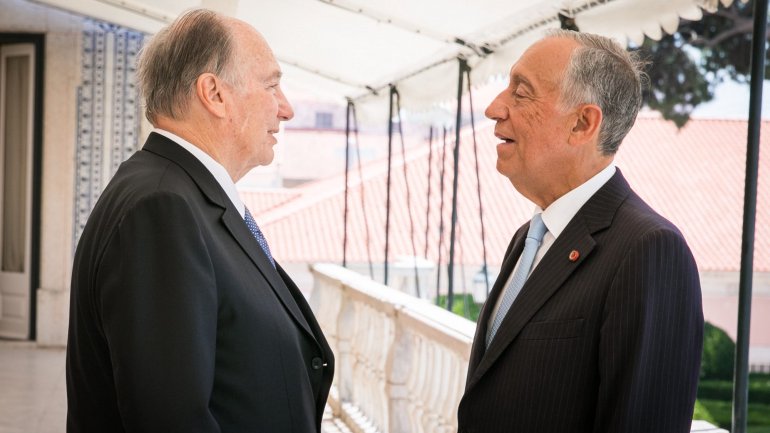
Aga Khan, o 49.º Íman hereditário e líder espiritual dos muçulmanos xiitas ismaelitas, é o mais recente cidadão português. O anúncio foi feito pelo Presidente da República durante a cerimónia de encerramento dos Prémios Aga Khan para a Música, que decorreu em Lisboa este domingo. A atribuição da cidadania portuguesa foi aprovada pelo governo há duas semanas, mas só agora anunciada por Marcelo Rebelo de Sousa, e como reconhecimento pelas ações desenvolvidas pelo Príncipe em prol da República Portuguesa. “Estou muito orgulhoso em tê-lo como ciddão português, sendo ao mesmo tempo um cidadão do mundo”, disse Marcelo Rebelo de Sousa.
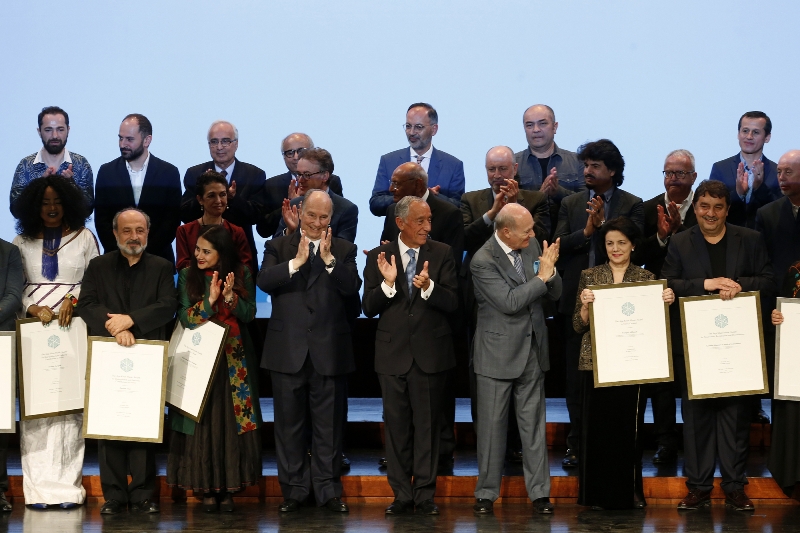
Marcelo Rebelo de Sousa ao lado de Aga Khan na cerimónia de encerramento dos Prémios Aga Khan para a Música este domingo, em Lisboa
O relacionamento entre Portugal e Aga Khan desenvolveu-se de forma mais intensa a partir de 2015, depois de ter sido assinado o acordo bilateral que consagra que a sede mundial do Imamat Isamili, instituição liderada pelo Príncipe Aga Khan, ficará em Lisboa. Para instalar a sede, Aga Khan comprou à Universidade Nova de Lisboa o Palácio Henrique Mendonça — um edifício do início do século XX, classificado como imóvel de interesse público desde 1982. Depois das obras de reabilitação, vai acolher o gabinete do líder da comunidade, mas também a estrutura responsável pela Rede Aga Khan para o Desenvolvimento, em particular a Fundação Aga Khan.
A Rede Aga Khan para o Desenvolvimento começou a atividade em Portugal em 1983, através da Fundação Aga Khan Portugal, e é desde esse ano que o Imã tem um representante diplomático no país. A presença reforçou-se a partir de 2015 e tem sido visível na componente solidária da Instituição, desde a ajuda às vítimas dos incêndios de Pedrogão, à doação de obras de arte.
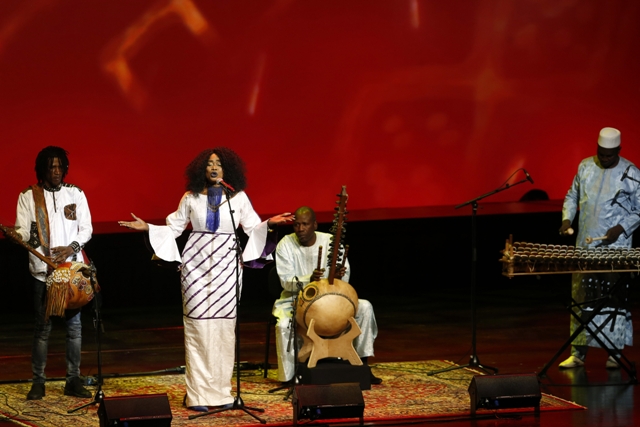
Recentemente, Lisboa foi o palco escolhido para a cerimónia de encerramento das celebrações do jubileu de diamante de Aga Khan.
A cerimónia de encerramento dos Prémios Aga Khan para a Música , no valor de 500 mil dólares, teve lugar na Fundação Gulbenkian. A cerimónia encerrou com um espetáculo final que reuniu nove vencedores, de seis categorias e oriundos de 13 países da Ásia, África, Médio Oriente, Europa e América do Norte. O egípcio Mustafa Said foi o grande vencedor na categoria de desempenho desta primeira edição dos prémios criados pelo Principe Aga Khan com o objetivo de promover a criação artística e musical de raízes islâmicas.
Espetáculo de encerramento dos Prémios Aga Khan para a Música, que decorreu este domingo em Lisboa
The President of Portugal discloses at the AKMA that H.H. The Aga Khan has been offered the Portuguese Nationality few weeks ago.
Marcelo Rebelo de Sousa
Portugal atribuiu cidadania nacional ao príncipe Aga Khan
31/3/2019, 21:59844
20
A decisão foi tomada há duas semanas, mas o anúncio só foi feito esta noite pelo Presidente da República. Aga Khan e o governo acordaram em 2015 instalar a sede mundial do Imamat Isamili em Lisboa.

Aga Khan, o 49.º Íman hereditário e líder espiritual dos muçulmanos xiitas ismaelitas, é o mais recente cidadão português. O anúncio foi feito pelo Presidente da República durante a cerimónia de encerramento dos Prémios Aga Khan para a Música, que decorreu em Lisboa este domingo. A atribuição da cidadania portuguesa foi aprovada pelo governo há duas semanas, mas só agora anunciada por Marcelo Rebelo de Sousa, e como reconhecimento pelas ações desenvolvidas pelo Príncipe em prol da República Portuguesa. “Estou muito orgulhoso em tê-lo como ciddão português, sendo ao mesmo tempo um cidadão do mundo”, disse Marcelo Rebelo de Sousa.

Marcelo Rebelo de Sousa ao lado de Aga Khan na cerimónia de encerramento dos Prémios Aga Khan para a Música este domingo, em Lisboa
O relacionamento entre Portugal e Aga Khan desenvolveu-se de forma mais intensa a partir de 2015, depois de ter sido assinado o acordo bilateral que consagra que a sede mundial do Imamat Isamili, instituição liderada pelo Príncipe Aga Khan, ficará em Lisboa. Para instalar a sede, Aga Khan comprou à Universidade Nova de Lisboa o Palácio Henrique Mendonça — um edifício do início do século XX, classificado como imóvel de interesse público desde 1982. Depois das obras de reabilitação, vai acolher o gabinete do líder da comunidade, mas também a estrutura responsável pela Rede Aga Khan para o Desenvolvimento, em particular a Fundação Aga Khan.
A Rede Aga Khan para o Desenvolvimento começou a atividade em Portugal em 1983, através da Fundação Aga Khan Portugal, e é desde esse ano que o Imã tem um representante diplomático no país. A presença reforçou-se a partir de 2015 e tem sido visível na componente solidária da Instituição, desde a ajuda às vítimas dos incêndios de Pedrogão, à doação de obras de arte.

Recentemente, Lisboa foi o palco escolhido para a cerimónia de encerramento das celebrações do jubileu de diamante de Aga Khan.
A cerimónia de encerramento dos Prémios Aga Khan para a Música , no valor de 500 mil dólares, teve lugar na Fundação Gulbenkian. A cerimónia encerrou com um espetáculo final que reuniu nove vencedores, de seis categorias e oriundos de 13 países da Ásia, África, Médio Oriente, Europa e América do Norte. O egípcio Mustafa Said foi o grande vencedor na categoria de desempenho desta primeira edição dos prémios criados pelo Principe Aga Khan com o objetivo de promover a criação artística e musical de raízes islâmicas.
Espetáculo de encerramento dos Prémios Aga Khan para a Música, que decorreu este domingo em Lisboa
